#It’s easy to reduce people to side characters or caricatures but you never know. You truly never know what someone’s going through or what
Text
It really is so true that you never know what someone’s going through behind closed doors. I’ve made being gentle and kind my default bc I’ve had super put together friends disclose the most harrowing time of their lives to me and it’s like oh?? You were going through that???? I would’ve never guessed
#It’s easy to reduce people to side characters or caricatures but you never know. You truly never know what someone’s going through or what#Could push them over the edge. Cruelty will never be worth potentially causing someone permanent damage#I’ve realized this after having a conversation w a friend of mine who sailed straight to med school#Tons of leadership roles#Thriving social life#Yet she just told me her hair was falling out from anxiety. Never in a million years would I have guessed that she was struggling#But she was and lots of people play things close to their chest like that#I really wanna be kind each time I can and to also come from a place of compassion#Bc ik I’ve been misunderstood by people before who reduced me to a caricature or just didn’t know what was happening in my life#I want to actively work on extending the benefit of the doubt to the same people I would want to extend the benefit of the doubt to me
522 notes
·
View notes
Note
i'm not really into the witcher series (mostly because it was never a part of my childhood but also in part because i watched like 2 parts of the netflix series and didnt vibe at all) but mr żebrowski is very handsome to me and his geralt seems very warm in a way while the netflix's one seems like the typical cold-hearted hero we're supposed to root for, also he looks like a freak in a un-sexy way. they seem like totally different characters to me how did they downgrade this bad
geralt's complete mischaracterization is one of my biggest beefs with the netflix adaptation mainly because book geralt is such a peculiar protagonist to me. he's really not like other girls and that's i think what drew me into the story in the first place. imo there's really no reason to root for the netflix geralt except for the fact that he's the main character which is just a sign of shitty and lazy writing. the polish adaptation is very flawed and limited by shitty polish tv funding but mr żebrowski and the writers both did their best to show all sides of geralt who is so complex like he's a narcissist and a cold-blooded killer but he can be so stupid and passive? and SO warm and lovely and dedicated. all of it at the same time. book geralt has his low moments, he makes mistakes and acts like an idiot BUT we as readers are there for him because he is first and foremost a human person with flaws and imperfections. netflix flattened him with a flatiron like they do in cartoons. like i don't know who that is in the show but that's not geralt! leave it to blockbuster people to suck the life out of the things you love and value by reducing them to easy-to-digest caricatures :(((((
5 notes
·
View notes
Note
Something I can never bring myself to understand is the MY fandom’s seeming obsession with *proving* Mahidevran or Hürrem as the more morally correct, more noble, more respect-worthy etc sultana. Or measuring whose actions and beliefs were the most justifiable or who suffered the most unfortunate circumstances. It seems to completely ignore the fact that most characters in the franchise, sans a small handful of characters, fall into the category of morally questionable or ambiguous. I feel like both Mahidevran and Hürrem are both victims to the same terrible circumstances and the enviornment in which they both lived and were forced to adapt to was a catalyst to a lot of their deplorable actions and beliefs. They both came to the palace as concubines with no family nor money to their names (I can’t recall if this was held consistent in the TV series for Mahidevran’s case or not but I know this is the case for her historically as well), both of them had their worth and their livelihood tied to their ability to produce princes and please the Sultan (who will take any opportunity to remind these women that they are a mere piece of property to him anytime they attempt to assert themselves in any way.) Then there’s the looming threat of the principle of fratricide that basically haunted them throughout the entirety of their motherhood. I’m in no way saying the immoral decisions they made was justifiable or somehow okay (Mahidevran killing Mehmet, Hürrem killing Mustafa, etc.) I just feel that there’s a lot of black-and-white thinking at play whenever the Mahi/Hürrem discourse comes up. What do you think?
Thank you for bringing this up, because it's probably the thing that bugs me the most about this fandom (outside of Tumblr currently). You voiced my overall thoughts into words so well!
I think these double standarts come from many places that can be both the only reasons for a person or just one of the many. In my experience, this "black or white", "all or nothing" attitude stems from the absolutist belief that people should pick sides and root for only one character (usually the protagonist) in a narrative. They're using the standard, superficial narrative roles of the protagonist and the antagonist in terms of Hürrem, thinking that for some reason the protagonist is always morally right in all she does, simply because she's the protagonist and we're supposed to unconditionally root for her. And if they don't like the protagonist, they choose root for "the other side" instead. They're better than that anyway, so of course, we should root for them!!
To be honest, the earlier seasons of the show make an attempt in justifying this assessment, with them having the narrative voice be rooted in Hürrem's favor, despite of all possible problematic actions that tell a different story altogether. MC Hürrem was given very understandable and sympathetic motivations, thorough character exploration, gradual character development and the privilege of far too obvious Plot Armor (make no mistake, every historical figure in the show has Plot Armor, but with the many attempts at her life, Hürrem's in particular, was way too glaring at points, sometimes to a ridiculous degree.) and the writers making her enemies doom themselves by their own failings, with her seemingly only enduring the "charade". (Valide's flanderization post-E38 is the most egregious example of this.) People I've encountered that are excusing Hürrem's behavior, are citing precisely the first episodes to present their arguments, often refusing to go beyond that. Mahidevran's motivations, while as nuanced as Hürrem's, don't seem as delved into in comparison at first (the origins and backstory of MC Mahidevran are shrouded in ambiguity, and while this is thematically appropriate for her character arc, as I explained here, it definetly doesn't help her case in bringing in more vocal sympathy.) and it could seem that her character is simply antagonistic to Hürrem, doesn't go anywhere and later revels in the depths of her ambition and wounded pride earlier than Hürrem began that similar development of hers. Some Mahi stans could see that probable difference of treatment in narrative and support her simply because of that, as well.
Assessing moral ambiguity isn't all that easy in the grand scheme of things, but it especially falls short when the narrative voice seemingly doesn't support it at first. But many miss that there's a very thin line between the actions and the narrative voice, that only turns into a very deep incongruity as the series progresses. I don't know, perhaps determing the moral ambiguity is indeed so complex, confusing and conflicting, since the whole story could get too complex and many might wonder who they'll root for now when everyone is so problematic. And that's a show that began as a simple soap opera, no less! Why would they even put in the effort in this case?
Not many people are used to ambiguous and questionable character development and are still trying to prove that there is one main positive characters in the show, which is why they try to make Mahidevran or Hürrem more morally right and justifiable than they actually are. They are so passionate about the debates they engage in, because this time period and MC is truly so ripe in analysis and it could be very fun to figure out where these characters come from and go through their 4-seasons long evolution in one chosen context, but by doing this, they so often miss the depth and nuance of the subject at hand and it all turns into a one-sided discourse that drives me nuts.
There is a historical context of the issue is also important to note, in my opinion. Both Mahidevran and Hürrem are historical figures and quite a bit of facts and deeds of theirs are now widely known. Most people in the fandom have opinions of them in advance or could've gained opinions of them a while after they began to watch the show. (There are also numerous fictional interpretations of the events during Süleiman's reign and the players in it, which may also play a part in the overall judgement.) Either way, the known historical facts about them (and other fictional interpretations one could've read, of course) could influence their points of view by a certain amount and use these general impressions to present them while analyzing the characters in the show. I've heard numerous arguments that this Hürrem isn't like the Hürrem the history knows about, that she isn't "their" Hürrem and what they read about her isn't depicted all that much in the show, which takes a lot away, according to them. I especially hate when they call MC Hürrem a one-dimensional "evil" caricature that only has vileness and smug about her, no conscience, no complexity whatsoever. (no, MC Hürrem isn't as simplistic and is much deeper and more nuanced. As far as fictional interpretations go, what they're describing is Hürrem in "The Sultan's Harem" from Colin Falconer, not MC Hürrem! In the MC/K franchise's terms, all they're doing is reducing her to the level of MCK Turhan Sultan, which is disrespectful to this character, to say the least. Turhan is the exact thematic contrast to Hürrem smh while Falconer's Hürrem is the most absurdly evil caricature imaginable, at least IMO, please and thank you!) Or even more unbelievably and outright hilariously, considering Hürrem's actions and the Sultanate of Women overall the downfall of the Ottoman Empire o.o and that's why Hürrem is so ruthless, so cruel, always intentionally, of course. This is plain ridiculous. Mahidevran, on the other hand, is presented by this clique as her "victim", as a completely innocent victim that had everything taken away from her. That Hürrem had stood between her and Süleiman and "ruined" their family. This take ignores every other factor of this falling out (Süleiman, that is) and a part of the nuance of Mahidevran's character. Reducing her to a simple "victim" doesn't cut it at all. Conversely, we have fans that simplify MC Mahidevran's character beyond every belief, loving the historical figure, but claiming they made her an "evil" and "stupid" bitch that cries and whines all the time. It's limiting and one-sided and even if it appears so, there are way far more layers to her character, that develop consistently throughout the narrative. The historical context of the time period itself is usually brought up in the debates, too, justifying whoever they want to justify by "It's a war, only the strongest ones survive!" or "You eat or get eaten! We should understand their time period, not judge by our contemporary times !", which is understandable and valid, but the only thing they end up doing is applying this logic only to their preferred characters when it should be applied to everyone. They try their best efforts to make one more morally right than the other, but they continually fail in the process, because the metric they judge them from is plagued by double standarts.
I wholeheartedly agree with you that excusing one of them, but not the other for most situations is wrong, because Mahidevran and Hürrem.... aren't all that different. What most people seem to miss, is that their character arcs are so contrastingly paralleling, because both of their endings were far from victorious and they got it for the exact same character reason, gained in a different way and in a different time. The persistent insistence of the fandom wanting a main character necessarily having a triumphant grand finale fails flat immediately, because there is no true victory in the franchise. They also miss the negative character development of both of them, them having to do the exact same stuff in many instances, both of them letting go of their pasts and/or former attachments, becoming vicious and ruthless in order to adapt to the circumstances, both of them had to make moves out of desperation because they felt threatened and they both protected their lives and the ones of their children at the end of the day. Heck, they're way more alike than they're different in my book. There is no morally right, no more noble here. Both of them had no qualms to do whatever it took to secure their own future and as you said, the narrative presented very neat motivations for them to do so as a whole. There is always a shade of grey and yes, who has the lighter shade of gray could be up for debate due to differing sympathies and perceptions, but that mustn't stop people to at least try looking at the "bigger picture" and try to view their characters with a bit more criticality, depth and respect.
Rooting for both conflicting sides is still seen as questionable and contradictory by some, but there really is nothing wrong with exploring their motivations without justifying them, no matter where your sympathies extend. I think it creates a more unbiased outlook on the both these characters and the themes around them and it's always awesome to see people doing that in any fandom, really.
And both Sultanas are worthy of respect, I said what I said.
#magnificent century#mahidevran sultan#hurrem sultan#ask#stuffandthangs#again this is all in my experience#there could be many other reasons for the double standarts#but they're all equally wrong and one-sided and one-dimensional and transparent
38 notes
·
View notes
Text
it’s too goddamn cold&snowy here right now so i dove back into my summer-y-est fic <3
Made A Garden (chapter 4)
[ch 1] [ch 2] [ch 3] [ao3]
Fandom: The Penumbra Podcast
Relationship: Lord Arum/Rilla
Characters: Rilla, Lord Arum, Rilla’s Parents, The Keep
Additional Tags: Second Citadel, Alternate Universe - Childhood Friends, (categorized as ‘other’ bc arum is nonbinary when i write him bye), Lizard Kissin’ Tuesday, POV Alternating, canon typical Arum ignoring feelings, edited to feature my Rilla’s Two Dads theory
Fic Summary: Rilla’s parents take her out when they do field work. She’s a smart kid, and she knows how not to get in trouble when they’re caught up with their experiments and research. This time, they’ve taken her to an enormous, beautiful swamp, and their theory is that the monstrous presence in this place should be entirely dormant- which is why Rilla is so surprised, when she meets a monster for herself.
Chapter Summary: A conversation, an argument, and an interruption.
Notes: Please appreciate these children. Please. I care them................ also idk if this needs warning for, really, but i guess chapter warning for an adult Being An Asshole to a child? yeah.
~
"Why did you decide to start actually talking to me?" Rilla asks, laying lazily back on the thick trunk of a fallen tree, her hand draped to trail fingers in the slow-moving water beneath it.
Arum looks away from her, sinking his face further into the water for a long moment before he rises enough to answer.
"Well..." he says slowly, "when I determined that you and your... kin posed nothing of a threat-"
"Which I told you the first time we met," she interrupts in a chirp, and Arum scowls up at her until she laughs. His snout twitches then, a tell she's beginning to suspect means that he's burying a laugh of his own, and then the monster sighs.
"Which I needed to have proven, for the safety of my lands and my own self," he amends, hissing. "I decided that you should have an eye kept on you."
"And..." Rilla tilts her head back, her long braid rolling off the log enough that the end dips into the water beneath her. "You decided to do that yourself?"
Arum raises an eyebrow. "Who else would?"
She shrugs, her shoulder pressing against the bark beneath her. "Mm, I dunno? I just figured- you're the Lord of this place, right?"
"I am," he says, stiff and proud.
"So, I figured you'd, like, have someone else you could send, if you wanted to keep an eye on us?"
Arum growls, though he looks more sullen than angry at the assumption. "Perhaps I simply didn't want to risk any of my subjects in the effort, just in case I was wrong about you."
"In case..." she trails off, and then she blinks. "So, what, you'd risk yourself, first?"
"I can take care of myself," he snaps, his frill flaring quick enough to splash a little halo of water around his face for a moment, rippling across the surface of the pond. "And- and a good ruler is concerned for his subjects before himself, anyway. That is my entire purpose."
Rilla tilts her head a bit more, trying to get a better look at the vague purple blush coloring the webbing of his frill. "Huh," she says, and then his words sink in a bit more. "But- if you got yourself hurt-"
"I can take care of myself," he spits again, and she frowns.
"But if," she insists, "if something bad happened, who would take care of the swamp, then?"
Arum scowls up at her, and then he ducks his head beneath the water entirely. For a second she thinks that he's just going to disappear again, and she sits up, the wet tip of her braid flicking water along her arm, but then Arum reemerges a few feet down the log. He flings himself out of the water like a salmon, then pulls himself onto the log ahead in front of her, easy and oddly elegant.
"You," he growls, glaring at her with his claws digging into the bark, "ask altogether too many questions."
"Is... is that an observation?" she asks slowly, "or do you- do you want me to-"
He exhales an exaggerated huff, then sits back on the log and lets his tail drape over the side. "You may do whatever you want," he says, not for the first time, "so long as you understand that I may do the same. Meaning that I will not answer, if I don't feel like doing so."
Rilla pulls one of her legs up, hugging her knee against her chest and letting her other leg dangle. "Yeah," she says, and then she grins. "Yeah, you've kinda made that pretty obvious by now."
"Good," he mutters, and then he flicks his tail in the water, splashing her leg.
She laughs again, surprised, and Arum's snout twitches.
"Okay," she says. "Okay, mister secrets, I'm totally and completely informed that you're not gonna answer anything you don't want to, but you have to know that I'm still not gonna stop asking." She grins, and the monster frowns at her, and then sighs in an exaggerated way and looks off towards the edge of the pond instead. "So unless you're gonna tell me to stop-"
"I rule my swamp, Amaryllis. Obviously I do not rule you. As I said, you may-"
"Do whatever I want," she parrots, bouncing her head back and forth. "You don't ask questions basically at all, do you?"
"If you wished to tell me about yourself, you would," Arum answers with a shrug, and then- he smirks. Rilla doesn't think she's seen that particular look on his face before, actually. "In fact," he continues, "you have. I don't need to ask, Amaryllis. You are perfectly content to share the bland details of humanity without any prodding whatsoever."
"Humans aren't bland," Rilla says. "Just because you're bored all the time doesn't make everything else boring, it just means you aren't looking hard enough."
"Tell me something interesting, then," he says, leaning his head back and draping himself dramatically across the log, and for half a second he almost reminds her of Marc. She buries a laugh at the idea of the two of them meeting - Tal would get along with Arum better, she thinks - and thoughtfully drums her fingers off her chin.
"What sorts of things do you actually like?" she asks. "I'll be less likely to bore you if I know that much, at least."
The monster rumbles in his chest without opening his eyes, then makes a humming noise. "Blade combat," he says simply. "Music. Pollinators. Translations and ciphers. Questions within questions."
Rilla purses her lips for a moment. "Questions?"
"Indeed."
"So- wait. No, no- we just talked about this. You don't like questions."
Arum glances up at her, then, his mouth curling into a frown. "I think I know better than you do, what I like."
"If you liked questions, you wouldn't get so annoyed at me when I asked them."
"I don't dislike your questions," he says, sitting up again. "I dislike that you assume that all of them will be answered. A decent question will only lead to further questions, and trying to neatly tie anything to a single, simple solution will only reduce a thing from its true nature to a caricature of itself."
"If you can never find the answers, then how are any of the questions useful?"
"It's not about usefulness," he says. "It's about understanding, both the nature of inquiry itself and your own small place in the infinite."
Rilla frowns hard. "Those were a bunch of big words that mostly seemed to mean basically nothing."
Arum blinks, then gives a shocked, incredulous laugh. "How- how dare-"
"Even if a question leads to a bigger question, a bigger question is still an answer, Arum. Knowing that you don't know enough is still an answer. That's just- that's all just dumb semantics."
Arum sputters for a moment, then narrows his eyes. "I would say, I think, that the argument that a question is an answer is far more a matter of dumb semantics than the assertion that not all questions have answers, Amaryllis. You simply do not know what you're talking about."
"If you're not even trying to get to the bottom of the questions you ask, then maybe you're the one who doesn't know what you're talking about," Rilla says, and Arum scowls again, more viciously this time. "I think it's better to actually know things, instead of just- making everything even more confusing. Isn't the world already confusing enough?"
"Maybe for creatures as petty and small-minded as humans," Arum growls low, but as he opens his mouth to continue-
There's a noise. Unexpected, and out of place enough that it takes Rilla a moment to recognize it.
A small whinny, not all that far off.
When Rilla meets Arum's eyes again she knows he heard it too. He looks exactly as scared as she feels.
"Hide," she hisses, and Arum's wide eyes go wider.
"You hide," he snarls, slipping off the log and back into the water. "It could be anyone, you don't know-"
"Horse could mean knight," Rilla snaps, and Arum's frill flattens against his neck. "Just hide and-"
The brush at the edge of the pond rustles, and Rilla hears Arum gasp before he slips beneath the surface entirely, and Rilla holds her breath as she turns to see whatever pushes through the foliage at the edge of the pond.
Rilla doesn't think she's ever been less happy to be correct, before. The knight frowns down at her from beneath his helmet and atop his sandy-brown horse, and Rilla tries to lean into her surprise so the guilt hopefully won't show.
"Oh!" she says, pressing a hand to her chest as she scrambles to stand on the log. "Oh, I- you scared me! I didn't hear you, and-"
The knight narrows his eyes, and Rilla realizes that his hand is resting on the pommel of his sword as his gaze sweeps suspiciously across the shore.
"What is a little girl like you doing out in the wilds all by yourself?" the knight says slowly, and Rilla-
Rilla isn't the best at reading people, but something about the way his mouth curls, the way his eyes stay suspiciously narrowed, something tells her that his tone is less concerned for her, and more concerned by her.
"Oh," she says, and she tries to smile. "Well, I'm not by myself," she says. "My parents are- they're not far."
"Hm," the knight says, and then he swings himself down out of the saddle.
Rilla takes the moment to glance down, and- and she has to hold herself very very still to keep from flinching when she realizes that Arum is still in the water beneath her. She was certain that he'd be- completely gone by now, safe and away and- and she widens her eyes at him quickly while the knight is still busy with the horse, and she jerks her head to the side, trying to tell him- get out of here, obviously, get away-
But Arum glares up at her, his violet eyes furious, and then he jerks his own snout towards the knight.
"Who were you talking to?"
Rilla jolts, wobbling on the log before she regains her footing.
"Wh-what? I- I don't know what you're-"
"I heard voices. Who were you talking to?" the knight repeats, his hand still on his pommel even after dismounting.
His eyes are icy and sharp and unsettling, and Rilla decides that she's really, really glad that she's out in the middle of the pond, instead of on the shore with him.
"I-" Rilla pauses, then lowers her eyes, shuffling her feet as if embarrassed. "I was talking to myself," she says quietly. "I know I shouldn't-"
"You were shouting at yourself?" the knight drawls, dubious, and Rilla tries to smile. If it comes out awkward- well, that'll work too, right?
"Y-yeah. I was- I was making up an argument? I- I'm not good at- at arguing for real, so I like to- to practice? Sometimes? When I'm on my own?"
"Well," the knight mutters, looking away, "I believe you're not good at talking, at least."
Rilla swallows, ducking her head, and-
And in the water beneath her, Arum rolls his eyes hard enough to make a little ripple on the surface above him, and then he makes a face as if he's gagging on a piece of rotten fruit. Rilla presses her lips together tight, choking down an almost overpowering urge to laugh.
"Your parents," the knight says, and Rilla's eyes flick back up from the water to his sullen, stubborn face instead. "They let you wander around in monster-infested wilderness all by yourself, then?"
"They- um. I mean- this place is pretty safe, and- and they aren't far."
"That's what you said before,"
"Do-" Rilla swallows. "Do you want me to- to call them? I can- I have a whistle, I can-"
The knight seems to consider this, looking her up and down as if checking for weapons and then scanning his eyes around the shore again quickly, and then he adjusts his stance, his frame tensing before he nods. "I think you had better, little girl. Go on, whistle for them."
Does he think that I'm a monster? Rilla thinks, feeling maybe just the littlest bit panicked, and then she raises her hand to her neck to lift the whistle.
They have a whole system, Rilla and her parents, for the emergency whistle. There's a call for monster, there's a call for injured, a call for someone else injured, a call for not-an-emergency-but-you'll-really-wanna-see-this-right-now-it's-cool, a call for I'm lost, among others. Rilla doesn't use any of those right now, though, because her parents don't think about magic and medicine exactly the same way that the King does, so-
Rilla lifts the whistle to her lips, and she gives the call that means that she's spotted a knight nearby.
The knight tenses further, as if he's fully expecting to be swarmed or something, and when nothing immediately jumps to attack him he glares at Rilla again. She- barely manages to fake a smile, certain that she must just look like she's showing teeth at this point, but it takes less than a minute for her dad to come bolting out of the underbrush on the far side of the pond.
"Rilla- Rilla what's wrong?" he says in a rush, and he's always been a better actor than Rilla or her papa. When he swings his eyes across the pond and 'notices' the knight, the flash of surprise on his face looks entirely genuine. "Oh- oh, I'm so sorry, Sir-"
"Sir Caradoc," he says, his expression bemused (surprised, Rilla thinks, that she was telling the truth) despite his flat, toneless voice. "The Dauntless."
"An honor," her dad says, smiling sharply, "and what a surprise to meet a knight this far from the Citadel! What- Rilla, why did you..."
He trails off, his sharp on her own, and Rilla manages a weak smile of her own. "He- he was- worried? That I was out here all on my own, so- so I wanted- I wanted to show him that I was- that you were here, if I was got in trouble."
Her dad exhales, something like a sigh, and then he nods and turns his attention back to Sir Caradoc. "Well, I'm glad nothing's wrong, at the least. Thank you so much for looking out for my daughter out here, Sir Caradoc. Please- would you come back to camp with us? I'm sure you're out here on important business, but the least we could do is get a hot meal in you before you've gotta be on your way, right?"
Caradoc raises an eyebrow, but after a moment his lip turns up into a very slight smile, and he nods.
"It'd be a pleasant change of pace," he says. "Been weeks since I've had a meal I didn't cook myself, and I'll admit I'm not as good with a ladle as I am with my sword."
Her dad's smile goes wider and more forced at the reminder of the weapon, but he laughs lightly anyway. "Great! Rilla, c'mon back to shore, now. We might not be home, but we've got company to look out for, yeah?"
Rilla nods, plastering on a smile that she hopes looks as honest as her dad's, and then she- she aims herself so she won't land right on top of Arum, and she hops into the water.
When she's under the surface she cracks her eyes open, and Arum is- closer than she expects. His eyes are narrowed and bright, even through the murk of the water, and when she makes a vague get out of here motion with her hands, he scowls even harder, and then he reaches out and grips one of her wrists. He flicks his eyes towards the surface, then back towards Rilla, and he squeezes lightly before he lets her go again, retreating further down into the muddy detritus at the bottom of the pond.
Rilla gives him one more glance (she can barely see him, obviously he knows exactly how to blend in), and then she kicks her way back to the surface, and then over to the edge of the water where her dad can reach down and lift her back out.
Her dad keeps hold of her hand when she's back on shore, and he squeezes soothingly as Sir Caradoc leads his horse around the pond to join them, trampling through the brush with authoritative carelessness.
"We'll be fine," her dad says under his breath, before the knight will be able to hear them again, and Rilla nods.
She already knew that, actually. She knows they'll be fine, because her papa is clever and her dad is confident and charismatic. She knows they'll be fine because her dad is holding her hand.
As Sir Caradoc comes closer, batting aside a hanging branch and wearing his bland, professional smile, Rilla thinks about Arum's hand, too. She thinks about the odd texture of his scales against her skin, the way he frowned when he squeezed her wrist, the intensity of his eyes under the water.
Rilla is pretty sure - pretty sure - that what he actually meant to say with that little squeeze was be careful.
Pretty good advice, Rilla thinks, if the coldness in Sir Caradoc's eyes above that smile is anything to go by.
#elle's fanfic#the penumbra podcast#second citadel#rad bouquet#lizard kissin' tuesday#lord arum#amaryllis of exile#made a garden#🥺🥺🥺 they are BABIE.
10 notes
·
View notes
Text
Watching the Clone Wars, part 7
Well, this is a better batch of episodes than last time, solely due to not having to actually skip an episode because it was too awful to watch. With that said, click on keep reading to see reviews of "Brain Invaders", "Grievous Intrigue", "The Deserter", "Lightsaber Lost", "The Mandalore Plot", "Voyage of Temptation", and "Duchess of Mandalore".
"Brain Invaders" (2x08)
I'd rate this as above-average. I am not really into horror as a genre, as I previously noted, so I was pretty grossed out by the brain worms. However, it was a pretty nice Ahsoka and Barriss episode, although I think it's a bit weird that four Jedi Knights/Masters are necessary to interrogate Poggle.
Anyway, it's not an episode of The Clone Wars without some unexpected graphic clone violence. I don't blame Ahsoka or Barris for killing poor Trap - I even think this was well-written and conveyed the desperation of their situation well - but good god, it was startling. Also tense: that final approach to the medical station.
Not good: Kit Fisto entering a ship that's infested with brain worms with no PPE. C'mon, man, I know your headtails are majestic, but keep it covered up! Also not super great: Anakin and Ahsoka's little talk at then end. A lot of their interaction just feels forced. I honestly feel like this should have been a dialogue of some kind between Ahsoka and Barriss.
"Grievous Intrigue" (2x09)
Sort of a meh episode. I understand Eeth Koth is a bit of a bad-ass in the comics, and that does sort of carry over in this episode, but mostly it just seems like a vehicle for various Jedi Masters to quip while crossing blades with this somewhat delightful murder-cyborg. Obi-Wan gives a furious monologue to Grievous, which rings a bit hollow since the clone army has had precious little screen-time (at least relatively speaking) to exhibit their loyalty or spirit.
Shout-out to Cody and those 212th soldiers dog-piling Grievous. If only you'd had a lightsaber, Cody, you probably could have killed him right then and there. And if the writers let you and your fellows out of the background more often, Obi-Wan's speech would have rung more true at the time this episode aired.
"The Deserter" (2x10)
I struggled with accurately summarizing why this episode left me cold. After all, the focus is split between Rex and the pursuit of Grievous, and I love most of the clone-centric episodes I've seen thus far. But after some thought, I realized this episode felt like the culmination of a character arc that never actually occurred for Rex, at least on-screen. After all, this episode is only the third time he's been promoted to something more than the token Clone Character Who Doesn't Die At The End - the previous two episodes I thought were legitimately Rex-centric were Season One's "Rookies" and "The Hidden Enemy". We still barely know the guy, but in this episode we watch him wrestle with doubt about his role and reason for existence when faced with a fellow clone who's made radically different choices than he has, before triumphantly stating his place is with the army. This feels like it would be a great episode, if only we were more attached to the character. Writers have to build-up to those kind of moments, or they ring false.
Anyway, is it just me or is Obi-Wan getting a little angry in this episode?
"Lightsaber Lost" (2x11)
I wasn't expecting much from this episode, but it was actually very good. Aside from the annoying Cad Bane arc at the beginning of the season, the Ahsoka episodes have been improving a lot this season - possibly because she's been separated from Anakin for a lot of them. Losing a lightsaber feels like the sort of problem a Padawan might face, and the solution feels like the sort of thing an impatient teenager would resort to. Tera Sinube is a gem - I am always a sucker for the elderly teaching the next generation, and he does it so well! The animation was well done too, especially in the chase scenes.
I've been ragging on TCW for it's lack of interconnectivity between episodes and episode arcs, but this is a stand-alone episode done right: it focuses on what a secondary character (yes, I know she's supposed to be a main character, but she doesn't feel like it quite yet), allows them to learn a lesson that develops their characters in an organic way, and reverberates through future episodes (I hope!).
"The Mandalore Plot", "Voyage of Temptation", and "Duchess of Mandalore" (2x12 -2x14)
Oof. So, this was the arc that actually made me quit watching TCW the first time around. I am very lukewarm on Mandalorians in general, so that wasn't great. But aside from that, and from the well-attested issue of everyone on Mandalore looking like a Storm Front fantasy, this arc exhibits the same structural writing defects the entire show has shown far - and honestly, life is too short to watch bad TV. At this point, I know this main issue will never be corrected in the entire show run, so I can accept it and push through in the name of completionism and writing research, but at the time I wasn't active in fandom and it was enormously easy to just stop watching and move onto other, better, shows and books.
Now, I thought long and hard about how to review these episodes, but I think it's useful in this case to interview them as a singular block instead of individual episodes. The story is largely cohesive, if a bit strained. It is essentially Palpatine's PT plot writ small: he wants to take over Mandalore (a reason is never really explicated in the actual story, so who knows why), and he's doing it by essentially creating a false war between the CIS proxies, Death Watch, and the Republic proxy, which is Duchess Satine. If all goes according to plan, Satine will be shown as ineffectual and unable to rule her people, and the GAR can occupy Mandalore for reasons of "public safety". This will inflame the Mandalorians, who aren't part of the Republic and don't want to be, and send them rushing in the arms of the CIS-allied Death Watch, starting a cycle of radicalization and violence which will end (at least from Palpatine's POV) with Mandalore firmly in his grasp, and all potential opposition killed in the Civil War he engineered.
As enormously stupid as the whole plot sounds, it's a valid historical tactic for imperial powers looking to expand. And that's lead us the the primary flaw of this story: The Jedi are the Bad Guys. Just ignore the tangled mess of Mandalorian canon, retcons, and expanded universe, past and present - in the show itself, they are presented as a smaller, weaker neighbor-state, and the Jedi are acting as agents of an expansionary military power, interfering with their internal politics specifically for the purpose of a soft invasion. And that's an interesting story! But that story is deliberately obfuscated and hobbled because the writers and producers of TCW were and are ever-so-concerned with making the Jedi as sympathetic as possible, even in situations where they shouldn't be.
Part of that hobbling is Satine's character. Satine is badly written, but she's badly written in a very specific way that has been common to most of the non-CIS political antagonists the show has presented thus far. Satine's most interesting characteristic is that she doesn't want to involve Mandalore with the war - and who can blame her? The Republic and the CIS have nothing to offer to her or her people. The only thing that will happen is the exploitation of Mandalore's natural resources (at best) or the destruction of her people, caught between two Great Powers who obviously don't care for her people's struggle. That's an interesting character, right? A POV we haven't seen in this show so far, which has consistently been from the Jedi POV, which is pretty firmly in the CIS = monsters and Republic = assholes (but democratic assholes!) camp.
But it's a POV that is pretty uncomplimentary of the Jedi role in this war, which means Satine must be crippled by an obnoxious belief in pacifism, like the unlikably-written Lurmen in season one, and also weighted down by a personal connection to an avatar of the Republic, like Senator Farr and his "family friendship" with Padme overcoming the fact that his people are starving and getting no support from the Republic. I have heard people argue that TCW, written as it was in the late 2000s, is reacting against the excesses of the War on Terror. I am less than convinced, mostly because every single anti-war character is reduced to a flat caricature of an annoying pacifist that can be safely defeated by the ever-so-kind warrior monks in the space of an episode or two before being cast aside for the next adventure.
Because Satine's motivations are poorly written, her actions don't make a lick of sense. In "The Mandalore Plot", she's clearly escorting Obi-Wan around under duress - but in "Voyage of Temptation", she's apparently going with the Senators willingly to the Coruscant, to essentially beg the Senate to not invade. Why not write her as an unwilling "guest" of the Republic, invited without recourse to defend her people's sovereignty? Well, that would show Obi-Wan in a very unflattering light, wouldn't it? But in "Duchess of Mandalore" she's back to being a prisoner in everything but name, escaping custody to receive an unaltered copy of her dead minister's speech.
Now, Obi-Wan helps her at that point...but it's clearly due to some poorly-written romantic feelings. I am not interested in any Padme/Anakin parallels, mostly because I find it incredibly tedious and honestly not helpful in exploring Anakin's Leap into the Dark Side. This story is a gigantic missed opportunity to show the Jedi (or at least, a representative of the Jedi) wrestle with their roles as avatars of the republic, when the republic is so obviously manufacturing a reason to invade Mandalore. Palpatine is obviously orchestrating this whole thing, but he still (at this point in the show) requires the consent of the Senate to essentially annex more territory - and the Senate is perfectly happy to give him that consent, by the way. There is a fantastic story on the Jedi side about the clash of ideals vs realities, and the writers totally side-stepped it.
But pulling the focus out a little further, that has actually been par for the course for most of the Obi-Wan stories of season 2. He's been consistently more and more irritated about the war as the season has gone on, and made some off-hand comments about the ungratefulness of the Republic populace that, in the hands of a more competent writer, could have been a multi-season character arc about loss of faith in fallible human institutions, which would dovetail pretty well with his characterization in both RotS and ANH. Instead, his character remains the static wise-cracking Good Guy; Satine is the Designated Love Interest, unable to develop along more interesting and independent lines; and this arc falls deeply flat as a result.
They're not the only characters who are horribly underwritten. I mean, here we are at the end of Season 2, and have we yet seen a sympathetic CIS character, or an accounting of how Palpatine was able to take advantage of already extant fractures in the Republic to create a shadowy cabal dedicated to tearing it apart? No. It's all war crimes and evil laughter so far. The Good Guys always win (until they don't), the bad guys are always Very Bad, and there are no shades of gray in this massive galaxy. Again, ignoring the complicated Mandalorian backstory, Death Watch is extremely under-baked as villains. There could have been a fascinating interplay between Satine and Pre about their different visions for their people's future, but just as Satine is a flat Pacifist caricature, Pre is a dull Terrorist caricature.
I have to give a special mention to the horrible Love Confession of "Voyage of Temptation". This is the episode where Satine is written most consistently as Peak Pacifist. If she had instead been written as anti-war (but not necessarily a philosophical pacifist), her escape from Tal Merrik would have been a great inversion of that trope - and in fact, I thought it was at first, when she "confessed", and then had to make an annoyed face when Obi-Wan didn't immediately play along. Instead, they played it straight, and I've never felt more simpatico with a villain than when Tal Merrik complained about their timing. That fact that Satine's "pacifism" is then used as an excuse for Obi-Wan and Satine to hesitate to kill a terrorist, leading Anakin to kill him...like, c'mon. I get it, the writers want to show his fall to the dark side, you gotta play the ominous theme music, but is this really a particularly evil act by Anakin? I'm gonna be honest, if a cop or an armed civilian kills a mass shooter, no one is castigating them for doing so, but instead congratulating them for stopping a murderer from killing again.
Final note and the only one that explicitly addresses the Mandalorian elephant in the room: I hate the Darksaber. Like, I know we all gave KJA shit for the original Darksaber novel, but the fact that Filoni (or Lucas?) repurposed the name for a SPECIAL MANDALORIAN LIGHTSABER fills me with intense rage. They're fucking gun knights, you coward, stop inserting your weird Arthurian hard-on into my western samurai sci-fi pastiche.
And that's it for this batch of episodes. Up next: Boba Fett makes his first appearance in our chronological viewing, and we return to Mandalore a second time, much to my sorrow.
4 notes
·
View notes
Text
Why The Dragon Prince Season 3 messed up
SO I pRoMiSed YoU aN EssAY about why the third season of The Dragon Prince disappointed me, and as I'm arrogant enough to assume that you are interested in my opinion, I post it here. ;)
*rolling drums*
King Harrow sums up the conflict as a narrative of endless vengeance, wrongs on both sides, that had to be redeemed whatever the cost.When the Dragang finds the egg, they think about the peace that could come.
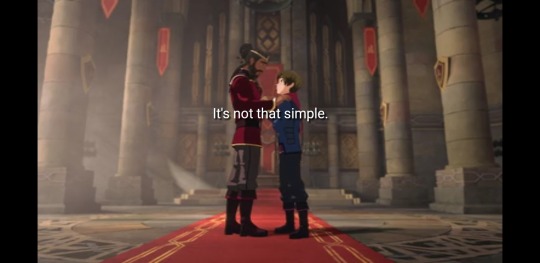
But when Rayla shows it to Runaan, he tries to kill her, then goes to murder Harrow. He learnt nothing from what happened and is just trapped into that eye-for-eye scheme. At this point, Runaan represents not only Xadia's ideology, but also the whole world scheme. The world is blinded by this narrative of revenge, so blinded that they refuse to considerate peace even at the cost of relatives -and yes, I’m including Viren if “the world”. So there's no guarantee that returning that egg will stop the war, especially that, as far as we know, it was the queen of the dragons herself who ordered this assassination mission.
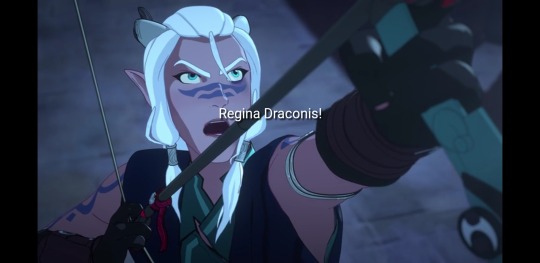
And Xadians don't stop there. They seem to work actively on kindle the fire. Elves are gathering at the Breach and attack human fortresses. And, just watch the episode where Soren attacks a dragon. Yes, Soren attacked first. But that dragon was flying over the city for days, fully aware of tensions, fully aware that humans were on their nerves after the kingslaying. If he just meant to afraid the people, he could just have left after dodging Soren's arrow; or simply destroy the tower, then leave. But he doesn't. Instead, he destroys the tower, then almost reduces the city to ashes, with the people still inside. When Callum finds out about it, he first doesn't understand why Rayla wants to save this dragon; but she explains him about the narrative of vengeance, that someone has to do something to break the cycle, even if she has to die for it. But she doesn't totally succeed and humans try to kill her, and the dragon gravely hurts a few of them before finally leaving. Even if, unlike Runaan, that dragon finally understood the hope the Dragon Prince was representing for the world (or perhaps he just flew away to warn Queen Zubeia), this doesn't erase the fact that he burnt down a whole city for no reason.
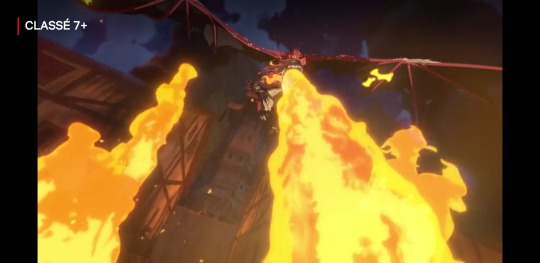
And Viren knows about that. Elves and dragons have exiled humans because they found a way to stop being considered as lesser beings who deserved nothing more than starvation. A quite unethical way, yes, but Elves could just give humans a bunch of Primal Stones if they wanted them to stop Dark Magic. No, instead, the Elves and Dragons exiled a whole people on sterile lands, Trade of Tears/Grapes of Wrath style, then ruthlessly killed all those who dare to pass nearby the border. Maybe the elves see it as a guarantee, a shield which prevent humans from doing unethical things. But to humans, that's just a knife over their throat. When they manage to get rid of that knife, elves and dragons just declare war on them, fully aware that they won't be able to defend.
Viren sees himself as the Jon Snow of the story, he wants to prevent a genocide, but no one is listening to him because they don't feel directly threatened. And the elves, in my opinion, had no intention of attacking the four other kingdoms, since their kings took no action against them (not even Duren). But if we set in Viren's shoes (Viren who saw his friends dying right before his powerlessness because of those damned critches), his point of view makes sense. He is also trapped into an eye-for-an-eye mindset -after all he is the one who murdered Thunder to avenge Sarai, and he is also trapped in a "protect my people whatever it takes." Just as the elves.
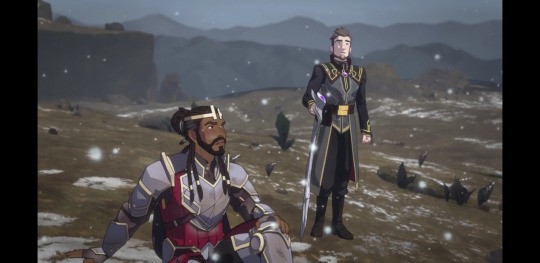
“That’s horrible, Viren.” “We have no choice.” “Story of your life in two sentences bro”
The heroes' job is to stop this, to break the wheel. To save lives from both sides -but more from the human side, given how Harrow qualifies this conflict "unwinnable war".**The thing is, in season three, the heroes didn't stop the war.**Well, effectively they did, but because they chose a side over the other. That was quite an easy choice to them, for their enemies were no more humans but soulless monsters. But that's exactly where the problem is.
The narrative brutally decided to caricature the conflict into a good VS bad framing :
Magic creatures are actually super friendly with humans!
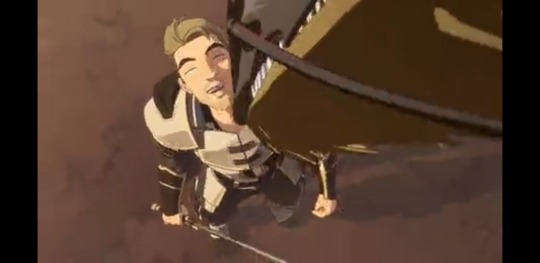
“Team Daenerys 4ever”
"Trees to meet you Callum! Yes I know, I was fully OK with my husband and daughter going into a suicide-squad to murder your father and brother, but no, I don't hate you, I think you are a wonderful person and that the world needs to hear a message of peace!" And the human army meets absolutely no resistance from the Xadians, that’s a proof Xadians were absolutely not hostile and humans are mean, racist, awful warmongers invading a land of peaceful rainbowed creatures! And the Dragon Queen is super happy about her baby's return and peace's arrival, so happy that she completely forgets -and so as the characters, that SHE sent those assassins over Harrow, and that her husband spent his whole life killing humans. And of course, the cast, including Soren, totally forgot about that dragon who burnt a whole city down, because dragons are, I guess, way more badass and cool than mere humans...
Viren stops thinking and being sorry about his actions.
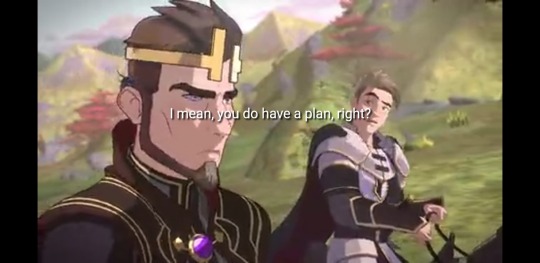
“No son, I don’t, I was too busy looking like a random bad-guy and admiring a sexy starry butt”
You might say, it's because he now acts instead of just talking. But just look his attitude when Amaya confronts him back in season 1. He's mad about her insinuating he murdered Harrow and even proposes the throne to her because she is the only one apart from himself, who cares about the elves and dragons. When Claudia asks him about Soren's life, he takes a while before responding, and doing so, his face is definitely not some Ozai's one. Or when he steals the king's stamp. He hears the screaming from the fight -he is traumatized by the elves and dragons. He looks at the family portrait, the family that was destroyed partly because of him, and definitely, has deeply sorrowful features on his face, while no one can see him, so there's no one in front of whom to pretend anything. And this isn't the only example of th- What? Season three? hahaha! no, he's definitely not sorry about imprisoning Ezran and shouting to Soren that his life didn't matter the slightest!
Even if he was quite desperate when he was in jail, because he thought humanity was just doomed, this just doesn’t fit...
Oh, and he lost his brain when he gained the crown, and that was totally ridiculous and out-of-character. I mean, given the little we see from Harrow's reign, it was Viren who just handled the whole kingdom for ten years. The cunning king's shadow, who always had a back-up plan to fix Harrow's stupidity thanks to his knowledge, inventiveness, eloquence; the guy who raised Claudia; this guy is now unable to utter a single idea of his own because of a sexy elf’s butt and voice who gives him some validation? Haha. I don't believe it for a second.
And not to mention how kiling him just solved the entire conflict, like he was the one who caused it in the first place. He murdered Thunder and Azymondias and gathered an army to make his crusade, yes. But he acts this way because there already were massive thousands-years-long tensions before. Viren was a product of those tensions, not the direct cause.
But then I suppose it was so much simpler to have a random Iago/Claudius/Richard III/Scar/Jafar/Rasputin/Melissandre...
Oh, speaking of questionable using of fire.
The Cinder-heart soldiers.
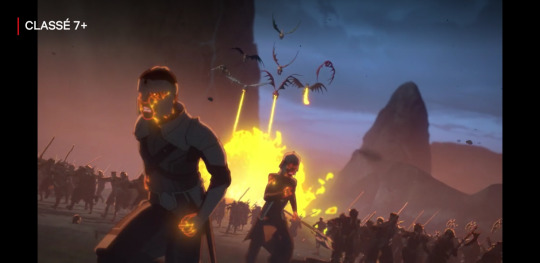
“DRACARYS !!”
When people talk about Dark Magic, they describe it as a shortcut, an easy way, a magic problem-solver that gives a far too proper way to determine what's right and wrong, who has the right to live and who hasn't. Well, with the Cinder heart soldiers, writers do exactly the same. They don't use Dark Magic to address ethic issues as in season 1 and 2, here they use Dark Magic to give the viewer something to thrill about, to draw a neat, clear, proper, defined line between what's right and what's wrong. With those humans turned into soulless monsters, you can say that the elves are right to defend themselves because those monsters are stronger than they are; but you can also say that killing them isn’t such a big deal since they have no soul. Of course, that can be used as a tool to point Viren’s fucked up morality, to point that the greater-good mentality can lead to atrocities. But that just doesn’t work. If they wanted to sum up the absurdity of war, writers could have left the soldiers as they were: humans who think they’re doing the right thing but only lead to disaster.
By making these monsters of those soldiers, by making them Viren’s puppets, by making them extensions of Viren’s will and power, writers frame Viren as the big bad guy who’s fault is everything and who’s death will resolve all the conflict (pretty much how killing the Night King solved the ten-years awaited winter in two seconds).
And if I remember quite well, as illogical, rushed, nonsense, stupid, badly explained and outrageous king Ezran’s abdication was (GOD, that was SO STUPID. Ezran is Harrow's son, no doubts), his goal was to save lives. But at the final battle, he happily jumps over a dragon’s back to burn those exactly same lives down -even far more numerous than the ones he pretended to save His sorrowful look on a single frame is clearly not enough to make me believe he’s sorry. He never addresses or criticizes or points the fact that those creatures were humans, while he is supposed to be the main character of a show about ethics, and while Viren shows doubts several times and justifies his actions which he knows are awful. Kantian Queen Sarai did a whole vegan argument about how killing apparently soulless creatures wasn’t a way to solve problems, and she was presented as right in the long term. Kantian-Rawlian King Harrow rathered die that letting one soldier take his place (but he was bad at math so he didn’t realize how putting 200 guards between himself and invincible assassins threw his calculation down, but that’s another matter.)
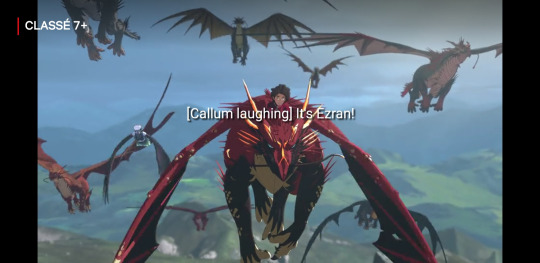
“DRACARYS YEEPEEEEE”
Then their son, the main character, the one who gave up his crown to save a few lives, the one who is supposed to carry the whole breaking-the-infernal-wheel thing, this character doesn’t even blink at the thought of lighting a giant pyre out of those people, Daenerys style. And who could blame him? How could anyone blame him? Those weren’t humans anymore. Those were a bunch of soulless monsters who were running at him to slaughter his friends and family. I don't blame Ezran for killing those. I blame the series for making those and not pulling a question out of it. Do you understand what I mean? The Dragon Prince was about ending an absurd conflict where both sides were wrong but had reasons to fight. But turning a whole side into mindless monsters (including Viren and Claudia, one being blinded by power and a sexy elf’s butt, and the other blinded by her love for her father) just threw that speech away. And not to mentions how their deaths are treated on a comic and cheerful mode (I definitely hate this baker).
Did I say “A whole side ?” Oh, sorry. My bad. I kind of forgot about someone.
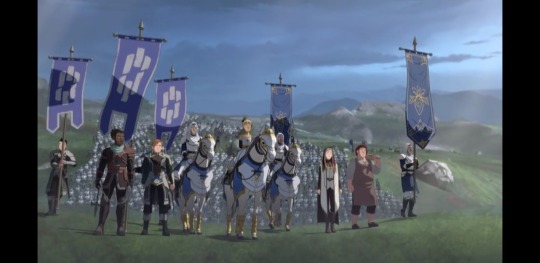
“A Mary-Sue is never late. Nor early. She only arrives when she was meant to.”
How everyone who ever sided against Viren for whatever reason is automatically a good-guy. Callum, Ezran, Soren, Opeli, Amaya, Aanya, Corvus, Gren, the baker (this DAMNED BAKER !!!) … I mean. When Viren came at the other royals asking them for help to avoid bloodshed, queen Aanya said “I won't send my army to face an unknown danger basing myself on a two-minutes speech!”. Very well, she doesn’t want to risk her people’s life because just one single kingdom messed up. That’s not her problem. I fully understand her choice here (even if she could at least enforce defences because Viren’s arguments were pretty valid). But when Opeli comes at her with pretty similar arguments “We need your army to avoid bloodshed”, she just accepts. Of course, we could explain her choice by strategic issues about how taking down three human armies all at once alongside with the magic army just makes her the most powerful human queen ever, even if that outcome was very unlikely given how unbalanced was the scale (I maintain it, how can mere arrows kill a magma berserk ? and even if she was relying on surprise, Viren's army clearly outnumbers gOoD gUyS's, as it was said several times)... But the season doesn’t address those strategic issues. Instead, queen Aanya just seems like Mary-Sue, like some low-cost Gandalf who has no other reason for being here except helping the good-guys against the oh-so-bad Viren. And as you know, good guys are, by essence, not interested in power (tHeY dOn’T wAnT iT)… So she goes to war right when the narrative is okay and when it helps the heroes. And of course, she arrives right when she is needed, even if, to quote Kronk, “by all accounts, it doesn’t make any sense”. (Kronk, who has the same French voice actor as Viren btw).
And about Ezran... even the series says that Viren was right on this point : having a world-war resting on a eight years old king's shoulders is the worst idea ever. Even if this kid has best intentions ever, no one can take him seriously. Not Kaseef, who's father was just slain. Not Saleem. Not even Opeli -whom "you should have someone you can trust to rule this kingdom, someone capable, strong, dignified, loyal, lawful" scene seemed like the most unsubtle manipulation ever, and should have foreshadowed some nuance or lust for power into her.
And about General Amaya…
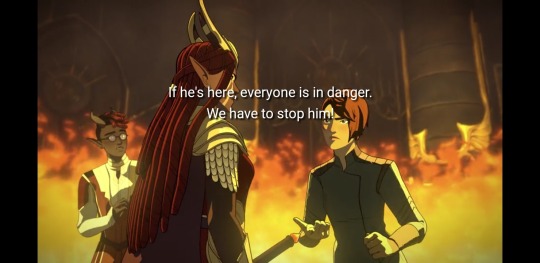
“I don’t know why I hate him, but he is so dangerous, so evil, and I hate him so much than I’ll side with the people who murdered my sister and drink my nephew’s blood !!”
Of course, there is only one single guy in the whole human realm who deserves to be called arrogant and rotten to the core. Of course, he is so dangerous, evil and bad-intentioned that she just gets alongside the army she’s been fighting her whole life along, the army whom she believes drink human blood and the army who killed her sister. I mean, even if she distrusts Viren because of how her sister died and how Harrow’s assassination benefits him, don’t forget that she is a human and that Viren is working to defeat elves, just as herself. I’m not saying she’s some awful traitor to her blood or anything, but just that she took her decision far too quickly, and that this decision was far too brutal, too defined, for to be credible for the viewer. But, guess what? She opposed to Viren once! That means she is a good girl, and that everything she does is the right thing, even if she has no reason to do so. And don't make me launched about Opeli...
So, the result of it: it gives the impression that the Sunfire Ordeal of Light was right. Elves aren’t wrong, elves are never wrong because they just have an unmistakable detector for right and wrong. The proof is, it found Amaya to be good and Viren being bad! Because Dark Magic is so bad, you know (sorry to the 100 000 of lives who Viren saved with that magic).
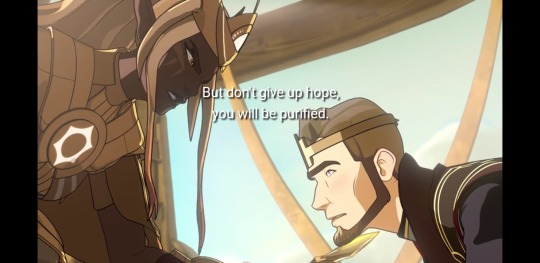
“You thought you were allowed to be a morally grey antagonist in a kids show? Haha, how bold of you, you fool !”
And of course, no important character dies amongst the “good-guys” side. Also on the bad side actually apart from Kaseef (whom treatment by the narrative was just disgusting), but Viren died before being brought back and Claudia was traumatized for life. The good guys? Oh, thanks for asking. All of them are well and safe because they brought peace by crushing that oh-so-bad Viren and his oh-so-evil-and-soulless army. Ezran and Aanya butchered hundreds of thousands of people by fire and arrows, and Viren died without Callum trying anything to save him, but I guess that was the right thing to do to prove the narrative of love and forgiveness. <3
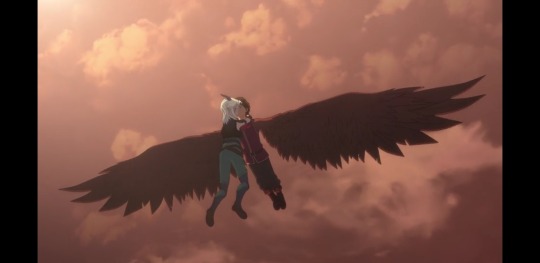
“Bye-bye oncle Scar”
And, on the top of that, the icing on the cake, the cherry on the top, "la cerise sur le gâteau" : getting Azymondias back to his mom just solved the entire conflict in one second.
I know the purpose was about stopping the war. But there, the series didn’t stop the war. The series chose a side and forgets about everything that was established in the first two seasons about the complexity and absurdity of war. The series just threw its whole own speech away by ridiculizing Viren, depicting elves and dragons as nothing but kind and gentle, defining a straight line between magic goodies and soulless baddies, and having a thousand years-long conflict resolved in a few seconds.
Do you remember when Harrow described this conflict as “not so simple”, as a thousand years-long conflict where both sides were so filled with hatred to each other that peace was nothing but a naive child dream? Do you remember when Runaan tried to murder his adoptive daughter when she tried to explain that peace was possible? Do you remember when that red dragon burnt down a whole city for no reason? That's a shame because the series doesn’t <3
And that can be explained very simply: NOT ENOUGH EPISODES. If only Netflix agreed to change the format, this series could have obliterated Avatar The Last Airbender or the Alabasta Arc from One Piece (which has a similar plot, but with some bad guys into it from the very start, and in spite of this succeeds into outstandingly depicting the absurdity of war). If only the TDP series has had more time to breathe, to explain and develop characters, motives, depths, events, (especially Ezran's downfall which didn't make any sense) it could have been LEGENDARY
.But instead, The Dragon Prince just ran straight into the trap it was so brilliantly avoiding in season one and two: Manicheism, black-and-white, goodies VS baddies, Simple narrative.
And I don’t even think a fourth season can fix this.
The final picture was too rainbowed, too happy-ending, too simple to be fixed. Yes, there are still “OH SO SOOOO BAD GUYS” and under-plots to explore (Aaravos’s final plan, Viren and Claudia’s trauma, Rayla’s parents including Runaan, Pip, cohabitation between critches and humans), but the series was about the absurdity of war and how characters dealt with it. Once this war is not only over, but also oh-so-happy-ended, I really wonder what’s left to explore. Even Dark Magic ethic, one of the most interesting part of the show to me, is ridiculed. By rushing, they handled their speech in a very clumsy way, and even worse: hypocritical.
The third season threw the series's speech to the trash by a too fast narrative… And I don’t know if I can forgive this.
Reminds me of GoT season eight, actually. But that’s another problem ^^
Thank you for coming to my TED-Talk.
#tdp#tdp season three#tdp s3#tdp Callum#tdp Ezran#tdp Rayla#tdp Zym#tdp Viren#tdp Claudia#tdp Soren#tdp aaravos#tdp Aanya#tdp Ethari#tdp Zubeia#tdp analysis#tdp meta#the dragon prince#tdp criticism
33 notes
·
View notes
Text
Just finished season 6 of Voltron, time for Dread’s opinions about mostly the show as a whole, but spoilers incoming
Ok this is something that has been obvious to me for awhile, but with the newest season out it has become glaring so time to type it out.
Voltron has a major pacing issue.
Because of the way they now release seasons, with 6-7 episodes per season (and inevitably at least 1 filler episode in there too that they really don’t have time for), each very short season has to be structured in a way to face some sort of evil, to have voltron save the day or have some big cliffhanger. That is barely enough time to do anything.
And because of that, the writing suffers.
The characters suffer.
And storylines are left hanging, or undeveloped. Some characters remain static for far too long, some characters are left hanging for seasons at a time (#bringbackshay2018), while other characters are rushed through rollercoasters of rise and downfall but it feels cheap.
And with that said, let me talk about Lotor. If you want to avoid spoilers, then here is where you really should stop reading.
Lotor comes in in season 3, right when seasons are reduced to 6-7 episodes. And he starts as a villain. A very likable villain- easy to see why he is very popular, and I will say that his voice acting is spot on. And by the end of season 4 it seems like he is set up to be a Zuko character, a villain that now allies themself to the side of good. And believe me, I love those characters! Its one of my favorite tropes!
But you want to know one reason Zuko is held to such high esteem to this day, as one of the best examples of how to execute this trope?
Because he was given time to develop.
Zuko doesn’t throw off his anger and quest to bring back the avatar instantly to join the side of good. It takes him time, and its not linear either- he questions himself, he makes mistakes, even when he joins with the group it isn’t like he is buddy buddy with everyone.
But Lotor doesn’t get this time, and not only! Not only does he have a villain turned good arc, but then this new season tries to turn that on its head by giving him a downfall.
Lotor was given the time equivalent of 1 actual show season (honestly less considering a lot of episodes were not focused on him) to be established as a villain, relinquish this and join the side of voltron, then fall into villainy and evil once again.
And sure, you may argue, he never was really a good guy, this season established that! But my issue is, I never did see him as a good guy. And the audience should, in order to fully accept why the paladins accepted him. He wasn’t given enough time to be established with that group, to be given enough character development except with Allura (which, please, I know she is naive but that freaking kiss come on- sorry not the point of this). And so his downfall didn’t hit me, I watched the season and was like, yeah that seems right.
It should have hit me. I should have felt betrayed, but it was empty.
And the reasoning, harvesting the Alteans? That felt like such a weak copout, like the only way for them to truly feel betrayed is if a group like the Alteans were affected. They could have done the same thing to any alien race and it should have had the same affect- why did they need to bring back Alteans when that created more plot contrivances than necessary. (Also like, the focus ended up being on Lotor’s betrayal but like, there is a planet of Alteans? And no one was like, worried Lotor might just like, send some ships there after they found him out? Unless I zoned out at that part but it felt very much like there wasn’t actually enough of a reaction to oh by the way your people aren’t nearly extinct and all. Hip Hip Hooray.)
I want to enjoy this show so much, and to some extent I do. The animation is good; there are good lines and moments for nearly all of the characters at some point; I’m biased because shiro is one of my favorites, but controlled clone shiro and especially the battle with Keith was mmm very good animation/deliverywise; every single character has potential, there is something there, they all have room to grow, to change.
But because of how its paced (and the writing in general, let’s be real), they end up feeling like flat caricatures of what they could have been.
#voltron#voltron spoilers#the show is just pretty cake icing at this point for me#which I can enjoy in small bursts but man#I wish there could be some meat to the show#please note that this is just my opinion and I am happy for everyone that thoroughly enjoys the show
3 notes
·
View notes
Text
What happened to Sherlock? Part II – Re-living memories
What is it actually that we witness in the TV show Sherlock? Is it Sherlock’s and John’s ‘reality’? Is it John Watson’s perspective, as in ACD canon? Or is it something entirely different? After S4 many viewers – including hard-core fans – lost their faith in BBC Sherlock. The characters we had learned to love (or hate) were ‘failing’ in S4: Sherlock seemed to have stopped solving crimes, John had turned into a violent wreck, ‘Mary’ the Assassin was suddenly a hero and there was not a trace of anything similar to a coherent plot line. In many ways this series seemed to have reduced the whole show into a caricature of its former self, and not much hope has been given that we can expect some change in the future.
But everything is relative, as Einstein might have said. :) What we expected of S4 was based on what the show had been to us up until then. So to comprehend what we’re actually looking at in S4, we need to first analyse what we were actually seeing in the first three series of the show – at least up until TSoT.
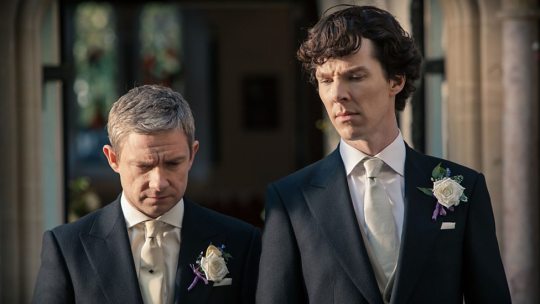
Picture source (X)
This meta series is an attempt to look at BBC Sherlock with a ‘scientific’ approach; to set up hypotheses and predictions, test them and thereby try to solve the puzzles presented to us, the audience, by the show. The methods I’m trying to use here are explained in the introduction. For this particular meta I’m also using a Word-transcript of John’s blog, where I have been able to use the program’s word count to compare the length of different blog-posts.
Hypothesis #1 was this: John’s blog is the most truthful account of the actual events.
I did a couple of predictions and compared them to my observations. My conclusion was that yes, this hypothesis does hold water. Which doesn’t necessarily mean that it’s true, but there is some evidence for it, and I haven’t seen it de-bunked just yet. So in the continuing analyses I’ll assume that Hypothesis #1 is true, that the blog is indeed more reliable than the TV show, at least when it comes to retelling the actual events (but not when it comes to John’s opinion of what’s going on in other people’s heads).
And now we get to the next hypothesis to explore, #2:
Hypothesis #2: The show up until John’s wedding is Sherlock re-living their story together in his MP, after reading John’s blog.
John’s blog is, in my opinion, rather straightforward in its description of John’s and Sherlock’s ‘adventures’. But as such, you could also argue that it is a bit dull; the blog does not quite live up to the ACD canon level of describing the events – far from it in fact. The John Watson that got published in The Strand Magazine used a lot more romantic and sometimes almost poetic language.
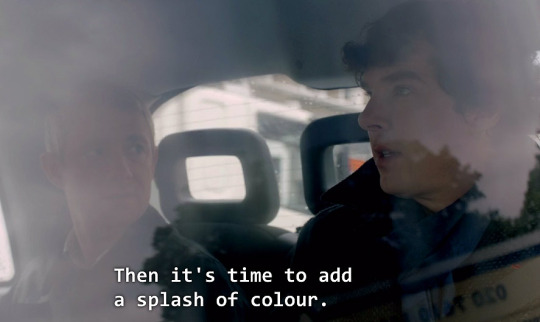
In this meta I intend to go through the TV show Sherlock from ASiP to TSoT, and analyse the perspective that the episodes are written from. I will stop at TSoT, though, since I see many clear differences between the show up until this episode and HLV. But that difference will be handled in a future meta about Hypothesis #4 (see the full list in the introduction, scroll down to the bottom)
This is a loooong meta, but please bear with me, because I do believe this is important. You’ll find most of it under the cut.
First of all, I want to give full credits for hypothesis #2 to @raggedyblue, who presented this idea to me in a comment to another thread, where we were discussing how reliable certain scenes in the show are. When I read it, suddenly it felt like some important pieces were falling into place, and I haven’t stopped thinking about it since.
Here is an excerpt from it:
“We are in Sherlock’s MP and we see his version of history from the beginning, because he was doped and started re-reading John’s blog. Because he is a romantic bastard after all. Then he was taken away, lost his control, and now he’s looking to return. In the show we never see any “real” scene. We’re in the funny, old Sherlock’s head. He’s reliving the facts up to where he was present, the wedding, and then he’s going ahead, trying to solve the situation in his head”.
But before this, the idea of us being in Sherlock’s ‘Extended Mind Palace from start’ had also been suggested by @kateis-cakeis, for example in this meta. Together with @ebaeschnbliah and @sherlockshadow, @kateis-cakeis has for example discovered that the Pilot is a complete mirror to ASiP! More about that in a moment. @sherlockshadow also makes a good and logical case for ‘EMP from start’ in this meta. Update: Thanks to @ebaeschnbliah, I also got the opportunity to read this interesting meta from @fandeadgloves, which makes a good case for why the whole show is probably seen from Sherlock’s POV.
Review vs analysis
But how do we know these ideas are not just wishful thinking? As I said in the beginning, it’s easy to get the impression after S4 that this whole show is something of a joke – if you take it at face value. If you believed it would be presented very much like ACD canon, albeit in modern England, you might have felt as disappointed as the guy who made this review video. And I think this is very important, because he is far from the only voice saying this. In fact I’d suspect that a majority of viewers might agree with many points he makes.
This guy has composed a long (almost 2 hours!) review of BBC Sherlock - the whole of it - and he makes a lot of interesting observations. Like for example the often overly dramatic music, the over-dramatized scenes, the excess of sound effects, but also that there’s a lot of plot holes. And he brings up all kinds of ‘baiting’ of the audience and the manipulative writing style with cliff hangers that never pay off. And – most importantly I think – the fact that the viewers are never given enough information to be able to actually solve the crime cases with their own brains; we’re forever left to just marvel at Sherlock’s greatness. So it’s obvious that he has indeed watched the show – and most probably done an amazing job collecting stuff for the review.
But he also seems to automatically assume that the purpose of BBC Sherlock is to show the crime case solving that Sherlock Holmes does, very much the same way as in ACD canon, and in most of the following adaptations, only this time in a modern environment. He assumes that this is a modern detective story, rather than a story about a detective.
But to me this feels a bit like reading John Watson’s blog, where Sherlock asks: “What about the analysis, John?”

I think Sherlock has a point here. The thing is that John, while good at finding clues, he never, as far as I can recall, really tries to analyse or deduce something. Except in TAB’s Victorian setting, which is definitely happening inside Sherlock’s head,

and in TLD, where a ghost starts to deduce things for him). John is mostly far too busy making assumptions and jumping to conclusions about people’s motives, at least on the blog:

But this guy who made the video even recommends us to not analyse the details of the show too much! (at 49:51 minutes into the video). He is bitterly disappointed (and many with him, I imagine – I’ve seen a lot of criticism where people dismiss the whole show as ‘badly written’) that the show doesn’t give us more episodes where we can follow Sherlock Holmes’ deductive reasoning to solve crime cases. But at the same time, his own video is full of assumptions about the show-makers’ motives (very much like John’s assumptions about Sherlock’s motives), and he utterly refuses to use Sherlock’s method of deduction and logical reasoning himself, while looking at the show as a whole.
Isn’t this a bit contradictory? Because if you find this many inconsistencies and crazy things in a show about a detective, I think you should ask yourself “why is this? What could the writers possibly have wanted to convey? What is actually going on here?” And then you go through each of these observations and try to figure this out, you try to make sense of them, preferably also trying to think ‘outside of the box’.
Example: According to this guy’s video the Pilot is far ‘better’ made than ASiP, for a series of reasons – most of them based on opinions about how a ‘good’ show should be constructed. But there’s no deeper comparative analysis between them that tries to find out why these episodes are so different and maybe suggest an alternative explanation. The judgment is done, end of story.
On the other hand, this video made by @kateis-cakeis (also referring to @sherlockshadow and @ebaeschnbliah) is also about the Pilot and ASiP, but the focus is on the data, and what patterns can be seen. They do suggest an explanation, but it’s presented as a theory, not a final conclusion. They have gone through a long series of similar scenes in both episodes, one by one, and found out that they are (almost) perfect mirrors to each other. People and objects that are positioned at one side in the Pilot is placed at the other side in ASiP, and so on. They’ve found a very distinct pattern that is difficult to explain away as coincidence. That’s a scientific approach; you use detailed analysis and deduction rather than jump to conclusions based on assumptions. You look at the pieces of the puzzle and try to figure out how they can fit together, and you use your own (and your peers’) creativity doing it. You may not reach a definitive answer right away, but you will have collected sufficient data to have a much better foundation for your future conclusions. And once you publish your thoughts, others can use your data to do their own analysis, and so on.
So what does this mirror analysis tell us? Well, most of all I think it shows that this show can’t be just about the crime cases; there’s something else going on here - otherwise the show makers wouldn’t have arranged details in this manner. So maybe we have to look for answers about this show elsewhere than in the actual crime solving. Because if the crime cases are the important puzzles to solve, why are we looking at a series of therapy sessions involving the main characters, that are mirrored already in Pilot/ASiP and have an increasingly iconic setup throughout the show? What has that to do with crime solving?

I think it’s logical, though; we can’t follow Sherlock’s deductions about the cases because that’s not what we’re supposed to solve - that’s Sherlock’s job!! But we can use deduction to figure out what’s on Sherlock’s mind, why he and John need therapy. But then we have to think outside the box and imagine that we really are inside Sherlock’s head instead of our own.
You could argue, of course, that TV audiences shouldn’t have to be (almost) scientists or psychologists to be able to enjoy a show. But maybe we don’t have to be, maybe we just need to learn Sherlock’s method. There are so ridiculously many TV shows that don’t require a single thought “outside of the box” from its viewers. So why shouldn’t this one, which is the story about a genius detective, at least require some brain gymnastics from its viewers? Something new, not just the usual stuff?
OK, enough of ranting and opinions for a while – let’s start the actual analysis!
Testing process, fueled by more observations:
So – just like last time we’ll make some testable predictions, but this time regarding the TV show (compared to the blog), to see if we can figure this out. This time I suggest four predictions to test.
Prediction 1. If Hypothesis #2 is correct, then there might be some indications in the show that Sherlock has been reading John’s blog - reading it carefully.
Observations:
Sherlock has made comments to John’s blogposts for a long time, but not in a particularly interested way; it took him two months before he discovered the first posts John made about their “adventures” together:
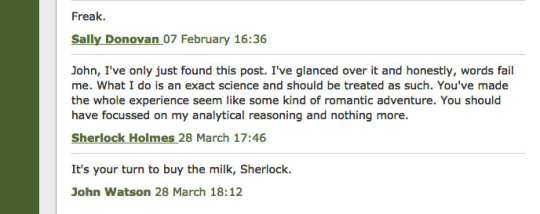
But here it says that he has ‘glanced over it’, which seems to mean that he hasn’t read it more thoroughly. He seems to be more focused on the form and grammar of John’s blogposts than on the actual content, and his comments are mostly rather brief.
In the show, he seems to express (or fake? ;) ) a certain indifference towards what John is actually writing.
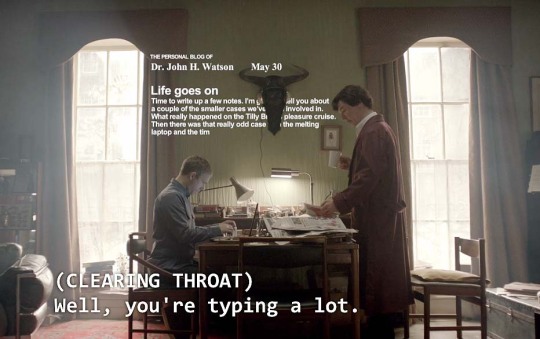
Maybe Sherlock can’t seem to bother too much with such trivialities as making a good blogpost (actually I suspect he’s more interested in hanging over John’s shoulder.. ;) )?
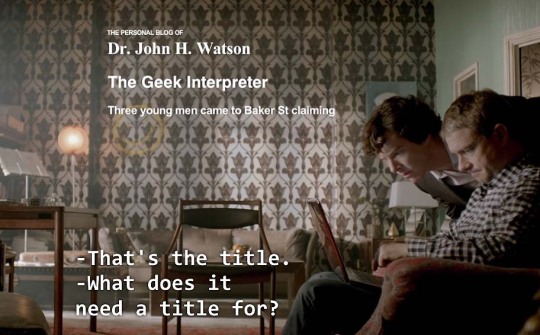
And he doesn’t seem to notice how much the blog means to John.

But he does get annoyed when John is presenting him in ways that don’t please him.
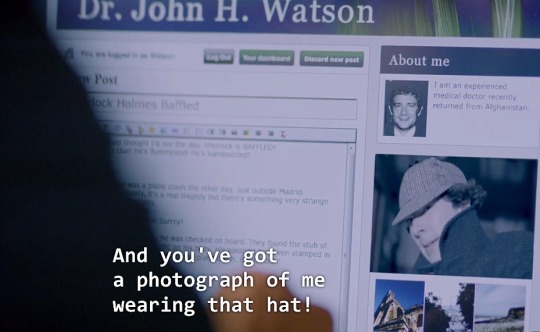
But there are two occasions when Sherlock definitely has shown interest in John’s blog - and none of them are covered by the TV show. The first one was when he ‘went through’ the blog searching for someone who could help him with a case (Death by Twitter is the blog title) by opening a closed facebook account. And he found “theimprobableone” (Moriarty?), who apparently then helped to solve the case.
And the second occasion is directly after the wedding, when he hacks the blog under the pretext of uploading wedding photos:

But he also adds a whole post about ‘sex holidays’, boredom and death and a string of comments at the course of two-three days. This time he really does seem to have nothing else to do than to read John’s blog and try to get some attention from its followers. I’ve written a meta about what I believe Sherlock’s messages meant here. John himself is on honeymoon, tells Sherlock to shut up and never writes a word about the wedding once it’s over, neither does he seem to appreciate Sherlock’s wedding photos, since he doesn’t even mention them. One might wonder why - wasn’t this supposed to be one of the happiest events in John’s life? Wouldn’t he even want to write a single line about it on his own blog?
There are quite a lot of talk about memories in BBC Sherlock; @sarahthecoat has made a useful list of books and other kinds of memory storage devices here. Memories indeed seems to be one of the recurring themes in this show, which also is a factor in backing up Hypothesis #2, I believe. And the blog as such is perhaps one of the most important memory devices, since John has given a thorough account of his and Sherlock’s life together - it’s like a public diary over their relationship. So let’s do an imaginative experiment - here’s a possible scenario that would fit with Prediction #1 for Hypothesis #2:
Let’s say that while John is on honeymoon for several days, probably about a week, Sherlock is at home in 221B - heartbroken, lonely and depressed. He has lost John forever (at least that’s what he believes), but he doesn’t quite understand what went wrong between them. He has quit working; he can’t really focus on anything else than John for the moment. And in his solitude, he begins to re-read John’s whole blog during this week, because he needs to know. He is not yet willing to engage with his own feelings for John, but in order to try and figure out ‘objectively’ what happened, he enters his mind palace and starts re-running the scenes from his memories, based on John’s blog entries. And this is the show as we see it from the beginning.
A wild idea, right? Is there really any evidence in the TV show to back up this scenario, to tell us that Sherlock was reading John’s blog during this time? Well, yes, I think there is. Apart from the ones presented above, I also think the show tells us about this specifically, it’s just that we see it after it happened, played out in an imaginative universe inside Sherlock’s mind palace:
Exhibit A: In TAB, which I’m going to assume almost entirely happens in Sherlock’s imagination (see lots of evidence for this in EMP theory), Mycroft talks about Sherlock’s recent OD and his history of drug use and then says this:
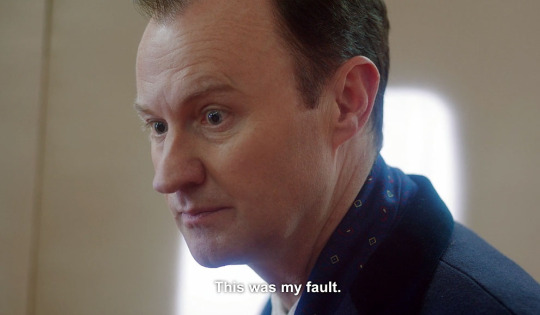
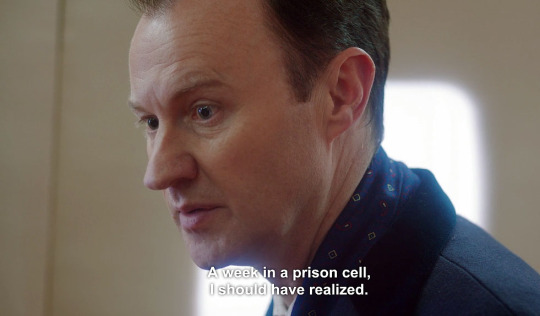

This is Mycroft saying this - on a subtextual level believed to represent Sherlock’s brain, and on a meta level he represents Mark Gattiss, the storyteller.
But if (at least) the second part of HLV also happens in Sherlock’s MP, then there is no Sherlock murdering Magnussen, consequently no prison for Sherlock, right? Thus MP!Mycroft is referring to something else - and what might that be? I think he’s referring to Sherlock locking himself up in 221B for a week in solitary confinement, starting to re-read John’s blog and re-living all his memories with John - including the most heart-breaking ones.
Exhibit B: Before this moment in TAB, when Sherlock has just woke up from his gay Victorian fever dream OD and starts babbling about Emilia Ricoletti, ‘Mary’ grabs his iPhone and says:
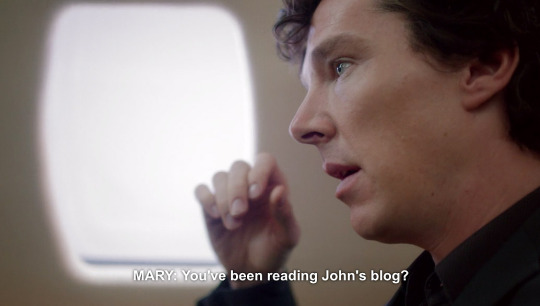
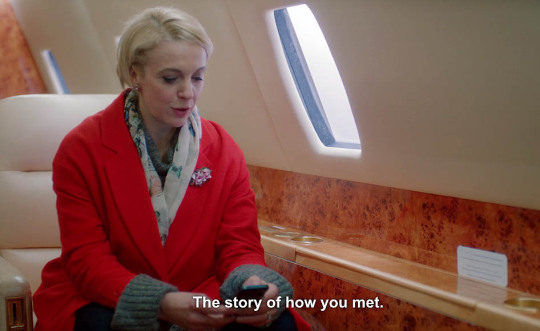
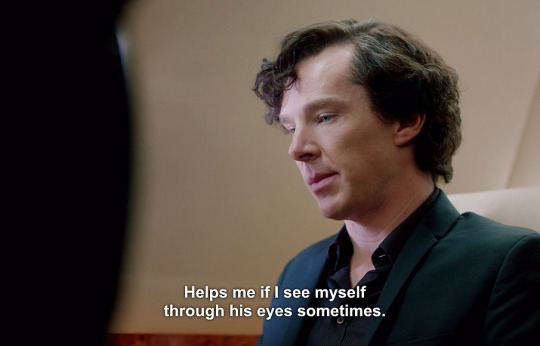
And if this scene also happens inside Sherlock’s head (EMP theory again), this evidence from MP!Mary points in the same direction: yes - Sherlock has been reading up on John’s blog, the story of how they met and of how they lived together at 221B. And with this, assuming EMP theory is correct about TAB being mind palace, I think Prediction #1 actually passes the test, and we can go on and make a second prediction.
Prediction 2. If Hypothesis #2 is correct, then some irregular patterns in the blog might have influenced Sherlock’s memory when he read it, and these irregularities would consequently also be reflected in the show. (If the show, on the other hand, shows us the ‘reality’, there would be no such corresponding pattern = 0 hypothesis).
Observations: Let’s compare the blog posts with their representation in the TV show.
Some of the more lengthy and thoroughly described blogposts are A Study in Pink (1742 words), The Blind Banker (1084), The Great Game (2323) and The Hounds of Baskerville (1373). Each of these has a whole episode in the show. I would also venture to say that they are all among the episodes with the most coherent plot-lines, easy to follow and not interrupted by much weirdness.
ASiB, on the other hand, is an episode that is partly divided into a series of flashbacks showing different cases that Sherlock and John worked with. The blog covers them as The Geek Interpreter (690 words), The Speckled Blonde (632), The Aluminium Crutch (1080) and The Six Thatchers (614). All these minor blogposts are shown very briefly in the show, more like news flashes, and The Six Thatchers isn’t shown at all (the events in the blogpost differ a bit from the later episode in S4, but the main structure is the same).
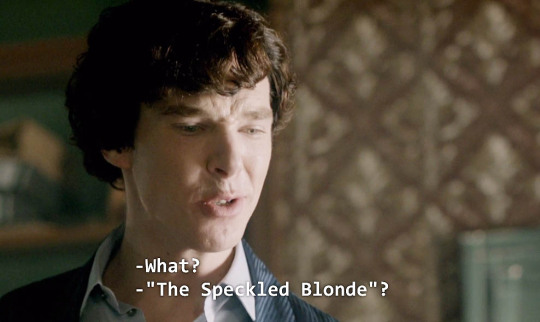
The actual main plot-line of the episode is covered by the very short blogposts Sherlock Holmes Baffled, By Royal Appointment, Christmas, Happy New Year, Actually Happy New Year and The Woman. The title ‘A Scandal in Belgravia’ doesn’t even exist on John’s blog (maybe it’s Sherlock’s invention?)! And as we know, ASiB has a lot of weird scenes in it, with spinning images, Sherlock being drugged, a dream scenario with Irene Adler, a mystic sitting John who is not really there, a plane full of dead people, quick leaps between different places, The Woman attending a client, Moriarty blowing a rasberry like a child, etc, etc. None of these things are covered by the blogposts.
And - strangely enough - the mysterious Boomerang case did apparently not merit its own blogpost - I wonder if Sherlock even told John the solution to this case? It would have been a great story, and there was no secrets connected to it! But the only thing John says about it is: “So there I am, dealing with a mysterious death in the middle of the countryside when suddenly I'm whisked away in a helicopter and taken to Buckingham Palace”. And the whole dead-people-on-a-plane sequence did not make it into the blog (John blames this on ‘national secrecy’ of course).
On the other hand we have TRF, which has a long, exciting and very distinct plot line in the show, but all the blog says about it is this:

And then he adds that Sherlock saved two childrens’ lives, and that’s it. John has good reasons not wanting to talk about it, though, since Sherlock supposedly committed suicide after this.
It’s definitely also worth noticing that apparently Moriarty both hacked the blog and broke into 221 B at some point between THoB and TRF, since he uploaded a video showing this on the blog. Jim pays attention to the following objects in 221B:
Lot’s of notes:

Headphones on the bison head:
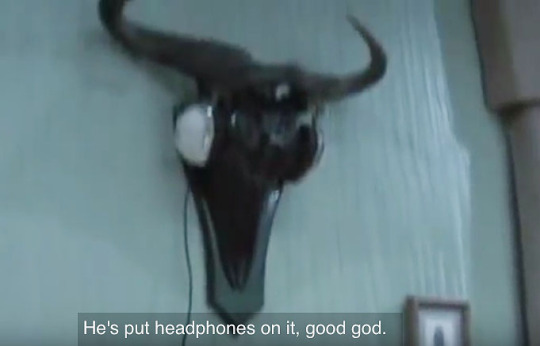
Abundance of books:

That Sherlock is emotional:
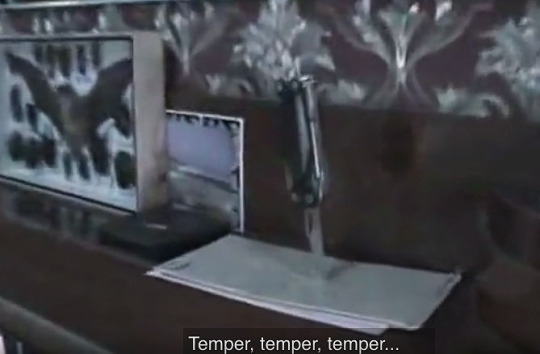
And - last but not least - Skulls!! I see you Arwel Wyn Jones
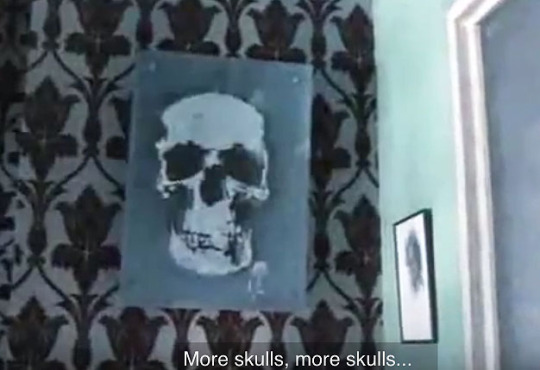
Jim’s break-in and blog-hacking is never addressed in the show, but I think it’s quite interesting that all these things seem to be recurring themes later in the show - including the fact that Moriarty shows up at 221B (I’ll get back to this is a later meta). I do regard this as more evidence for Hypothesis #2; if Sherlock has been reading up on John’s blog and is re-living the memories, Jim’s observations might have got stuck in his head for future reference.
Anyway, after TRF we have three short blogposts about cases that Sherlock had solved before TRF; The Deadly Tealights (410 words), Death by Twitter (452) and Murder at 'The Orient Express' (449). Non of them is mentioned in the TV show. The Inexplicable Matchbox (297), however, is briefly accounted for by Sherlock in his Best Man speech in TSoT.
And then there is Many Happy Returns - 470 words on the blog. It’s short in the show as well, but at least a little longer than most of the other renditions of John’s shorter blog cases. The hiatus was long, however, so it makes sense that the TV show would show us at least some things from Sherlock’s doing in the mean time. Which John would know nothing about, of course. ;)
In TEH, when Sherlock comes back, the show has this irregular plot line again, with a series of different cases and even more weirdness than ASiB. At first we see Anderson’s ridiculously romanticized (and heteronormative) idea of what happened to Sherlock at the Fall, and Lestrade dismissing it. Then Sherlock is captured and viciously tortured in Serbia, but when he comes back to London directly after, he seems fine and healthy; just a bit of shaving and he’s ready to play jokes on John. Which ends with more violence.
The time line is tricky to follow and the plot line is unfocused; when exactly was John kidnapped? How many cases did Sherlock solve before John saw fit to visit him? What was the whole terrorist plot actually about? And there’s a very strange interlude with Anderson questioning Sherlock about how he survived, at the same time as a terrorist bomb is about to explode in a subway wagon with John and Sherlock in it.
But the interesting thing is that the show’s twists and turns are fairly consistent with the blogpost The Empty Hearse (828 words), which starts with “Where do I even begin?”. The post is all jumbled up and mixed with a lot of John’s feelings - many of them expressing anger, disbelief and a deep resentment towards Sherlock. And back is the ‘psychopath’ talk, which John had tuned down considerably during the hiatus. (How can he even publish such rubbish as if he were writing an interesting account of a huge case of national security they solved together? And after everything he had said in Sherlock’s defense? I’m appalled, and tempted to agree with Sherlock’s blog comment “I see you haven't spent the last two years working on your writing technique”).
Finally, TSoT. John’s blog posts don’t cover the wedding at all, which would be logical if John only used the blog to describe the crime cases. But he obviously doesn’t, so wouldn’t this be something John would be happy to describe? His own wedding?? And he would definitely have time, seeing as he’s letting Sherlock do most of the wedding planning and preparations! But there’s nothing, and the Stag Do seems to be censored even in Sherlock’s brain by John: “We'd just returned from a quiet, civilised evening in the pub when our latest client arrived at Baker Street”. Not even the show shows us this picture. ;) (promo X)
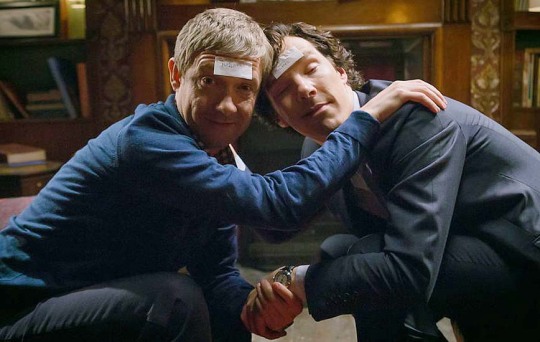
As we all know, however, the wedding stretches over a whole TV episode, much of which is telling us what Sherlock relates in his Best Man speech; he gives fairly brief accounts of a series of cases, and he has John’s blog open on his iPhone as support: The Poison Giant (695 words), Happily Ever After (577), The Elephant in the Room (150 words; censored) and The Hollow Client (396). Two cases he actually solves on site, though: The Bloody Guardsman (496 words) and The Mayfly Man (286). We also see a certain amount of weirdness, where time is sometimes played fast forwards (the dinner), and Sherlock has a long session in his mind palace shaped as a court room.
And, as the last post before the blog stops updating, there’s Sherlock’s own hacker post with the title of the actual episode: The Sign of Three (312 words).
Just one more thing about the wedding: what’s important is not just the stuff that’s in the show - it’s also what’s not in the show: the actual wedding! And I suspect we have a clue about that here:

We don’t see the actual wedding ceremony when John Hamish Watson makes his marital vows to Mary Elisabeth Morstan and puts a ring on her finger. Not even a flash of it! Sherlock does post some wedding photos in his one and only post on John’s blog, but none of them depicts the actual wedding ceremony. If the show would be ‘realistic’, wouldn’t this be just as important to show? Well, not if we’re inside Sherlock’s head, and the last thing in the world he wants to think about is precisely this moment...
So, do we have a general pattern here? Yes, in fact we do, I believe. The pattern is that when John describes a case at length and in detail on his blog, the corresponding episode in the TV show is also relatively lengthy and coherent. But when there are shorter case stories written, these events tend to merely get quick flashbacks in the show, if at all mentioned. And for ASiB, TEH and TSoT the main course of events gets split up into a series of different posts on the blog, while in the TV show they appear like a chain of events, full of suspiciously weird scenes.
My conclusion from this is that the show does vary according to the patterns on John’s blog. Which speaks in favour of the idea that we’re in Sherlock’s mind as he’s looking back on his days with John. It’s as if he adopts his brain activity to the blog pattern.
So, let’s move on to the next prediction:
Prediction 3. If Hypothesis #2 is correct, then there might be some tell-tale signs that we’re in Sherlock’s EMP, even if it’s not spelled out.
The concept of Sherlock’s mind palace (MP) is explained by John to Dr Stapleton in THoB, at Baskerville’s military lab:
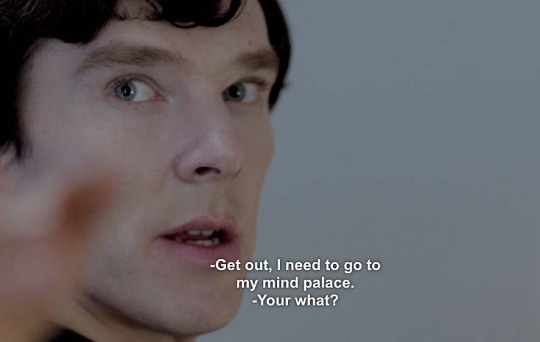

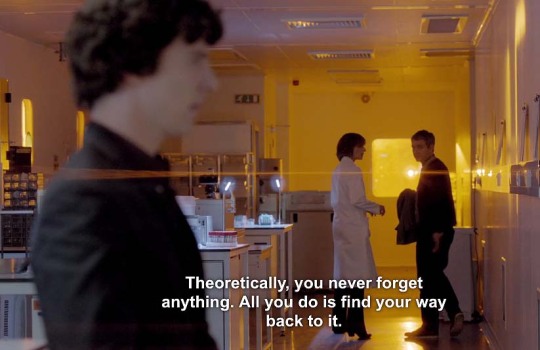
I think his MP is pretty thoroughly shown in the scenes that follow John’s explanation, in a manner that we then can recognize in the rest of the show. The usual ‘advertising’ of when Sherlock is in his MP is that texts and images appear on our screen and we can hear sound effects, and all this seems to have nothing to do with in-show ‘reality’. The contours get blurry and (sometimes rainbow-like) light patterns appear. And the whole scene is spinning.
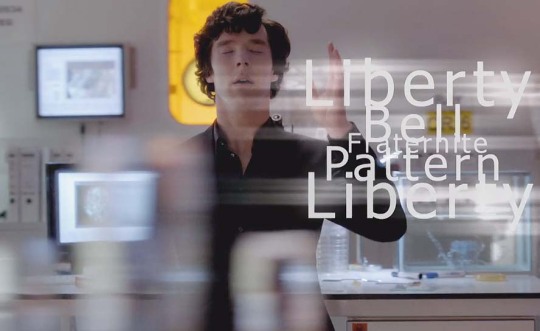
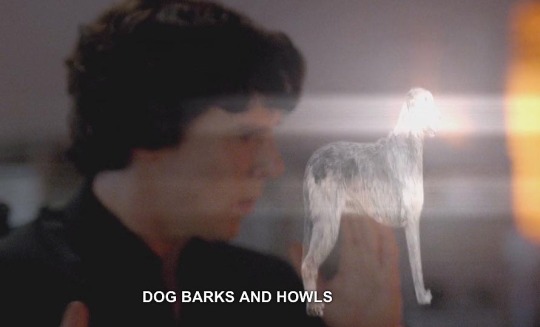
It’s just that sometimes these tell-tale signs occur separately even when it’s not obvious that Sherlock actually goes into his MP. The topic is treated in this meta, which has a lot of interesting contributions from different people in the additions. @gosherlocked pointed out, for example, that John and ‘Mary’s wedding photo was also a spinning scene - and that’s not supposed to be in MP, if the show is meant to depict ‘reality’, is it? And in fact, in this meta by @kateis-cakeis, we can see that there were spinning scenes already in ASiP - the very first episode.
I think @monikakrasnorada’s meta series “Hiding in plain sight” (8 parts in total) about the evolution of Sherlock’s mind palace is a very helpful tool for trying to sort out MP issues. @monikakrasnorada points out, for example, that some scenes in TRF appear to be ‘stealth’ mind palace; it seems like we are indeed in Sherlock’s head, even though this has not been clearly ‘advertised’ by less subtle hints such as deduction text flowing over the filming etc.
In fact, if we start to count the number of occasions where rainbow-like, blurry lights are showing on-screen, or where text is flowing over the screen, I think we’ll have to stay here for quite a while. It’s just that we may have assumed a) that these are ‘just’ artistic expressions from the show-makers and b) that every rainbow is ‘only’ meant as a hint about gay feelings. But those readings don’t actually contradict the possibility that we might be inside Sherlock’s head, do they?
But couldn’t we perhaps be in John’s MP (or mind cupboard or whatever)? Theoretically yes, but some reasoning and evidence contradicts this:
1. We have never seen any sign that John uses something similar to a MP – ever, neither does he ever mention this. On the other hand, there’s plenty of evidence that this is Sherlock’s method of using his brain, and John outright explains this in THoB.
2. There are scenes in the show that John couldn’t possibly know about. Like Sherlock solving cases in Tibet, New Dehli and Germany in MHR, when he was supposed to be dead. And Anderson being on his track. The blog post Many Happy Returns is about John stating that he has to put all these things about Sherlock behind him and move on. Dramatic crime cases in different parts of the world does not fit in with this.
3. But the times when we see John alone are in situations where Sherlock could, with his MP and extraordinary brain power of imagination, deduce what John might have said and done. And unlike John, Sherlock has his friend’s thoughts and feelings right there on the blog, as a prompt to start his deductions and imaginations from.
So, I do believe that enough evidence is presented here for Prediction #3 to pass the test.
So, here is my fourth - and last - prediction for Hypothesis #2:
Prediction 4. If Hypothesis #2 is correct, then the TV show will have a more emotional, dramatic and exaggerated account of the events than the blog.
For one thing, there is certainly way more emotions swirling around in someone’s mind than what you can read from blog posts.You probably don’t want to publish the same amount of and intensity of feelings that you can register inside yourself. And now it has been established in S4 that Sherlock is actually very emotional (Mrs Hudson in TLD) and was an ‘emotional child’ when he was very young (Mycroft in TFP). We also know from the very first episode that Sherlock is a real Drama Queen, and he admits repeatedly in HLV and TAB that he never could resist a touch of Drama.
But he would not tell John about his own feelings regarding the events, would he? It’s very rare to see Sherlock express feelings in the show - especially feelings regarding people. That’s precisely Sherlock’s biggest problem: he tries to repress Sentiment to a point where he appears to be a sociopath to others. So if we’re seeing the show from John’s POV he must have imagined Sherlock having a lot of emotions. Which would be inconsistent with his own judgments about Sherlock in the blog.
Like I said in my meta about Hypothesis #1: many things in this show seem exaggerated in comparison to John’s blog. Things are not exactly romanticized, but rather dramatized and more ‘fanciful’, given a ‘splash of colour’, overly dramatic music etc. And some things seems so cut out of an action movie that I doubt they’re even supposed to be ‘real’.
Observations: Let’s look at some examples from the show of overly dramatic or exaggerated events that aren’t even mentioned in the blog - or if they are mentioned they’re not described.
I already pointed out in my last meta the rooftop hunt in ASiP as not consistent with John’s description in the blog.
TBB: While John is doing something annoyingly mundane - quarreling with a machine at the supermarket (just the kind of ordinary things Sherlock seems to avoid with all his might) - Sherlock is in a thrilling life-or-death fight in 221B. A masked criminal dressed entirely in robes and scarves is attacking an un-armed Sherlock with a sword.

Some dramatic, oriental music is playing all over these scenes - even the supermarket one. But Sherlock takes the attacker on single-handedly and knocks him out completely in a matter of seconds. Strangely, by the time John is back from the supermarket, the unconscious man is already gone and Sherlock pretends nothing has happened. Nonchalantly, he offers John his credit card and sends him off on a second shopping-round - now with money. Not a word to John about the fight; why?
Why do I constantly get the impression that Sherlock has watched too many of John’s action movies? (and horror movies, judging by S4). ‘Bond night’ was something John introduced him to already about the time of TBB, according to the blog. And after that we get ASiB, with Bond references that are never mentioned on the blog: Bond Air and flight 007. The exaggerated treatment of the cruel CIA agent who was dropped more than once from a 2nd floor window and survived is also an example of weirdness (covered in my Hypothesis #1 meta)
And there’s more in ASiB that isn’t on the blog; Moriarty blowing a raspberry at a text he just sent, as if he could see it flying away? Who has the most lively imagination - Jim or Sherlock? And the Flight of the Dead audience - a Boeing 747 full of dead people that never took off.

Not technically impossible, of course. But to keep so many dead bodies from their loved ones without any of those finding out? No media headlines about a huge number of mysteriously missing corpses? One single leak would have been enough to destroy the whole operation. A bit risky to come from Mycroft with the Brains, isn’t it?
The silly little things, like the café conversation between John and Mycroft; the fact that Mycroft says 'it would take Sherlock Holmes to fool me’ is suspicious. Why would Mycroft suddenly recognize his little brother as being his intellectual superior in any sense? Wishful thinking, Sherlock! ;) And then the event in Karachi; did Sherlock travel there without John even noticing? Why is the sequence transmitted with disturbances, like it was for a broadcasting, and who would send it and why? And the most ridiculous of them all, yet another case of ‘Sherlock the action-hero’: He manages to fight a whole gang of heavily armed terrorists single-handedly, with a sword? This doesn’t even seem like Sherlock’s memory - it’s pure fantasy!
Then there’s TRF and Moriarty’s weird visit at 221 B. Sherlock is not present at the final session of Jim’s trial, and yet is he reciting verbatim what’s being said by the judge. Perhaps not impossible but quite unlikely. When John calls Sherlock after the trial to say than Jim was found ‘not guilty’, Jim is already on his way to Baker street; Sherlock’s kettle has just boiled when he arrives (takes about 3 minutes).

Now we’re talking impossible, though; how did he manage to get there so quickly? A London ambulance, according to Sherlock, takes 8 minutes to arrive (HLV), but Moriarty is there in 3? And why such a hurry? He was in custody - didn’t he at least need to ‘check out’ first? Weird. And of course, TRF is not covered by the blog, since John didn’t want to talk about it.
When Sherlock comes back in TEH, we get this irregular plot line again, with even more weirdness than ASiB. Sherlock being captured in Serbia might of course have happened, but what we see is a rather unlikely scenario, and absolutely none of it is mentioned in the blog. The weirdness consists in a) that the young Serbian guard is wearing an old Red Army uniform from WWII rather than a modern Serbian one,
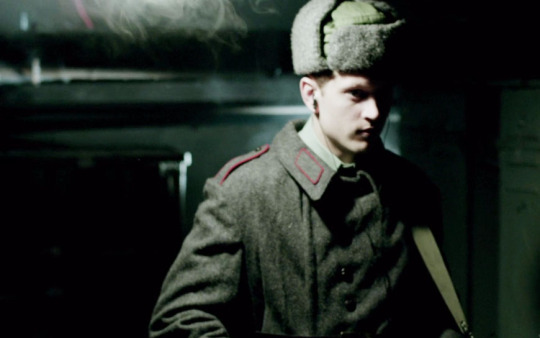
b) that Mycroft would treat his tortured brother like a piece of trash, even when the torturer was gone, and c) that Sherlock got his back whipped, but shortly afterwards we see him being shaved lying on it. Is this Superman?

And then he’s immediately fit to go play a joke on John. Yeah, right...
A more possible scenario I could think of (and this is mere speculation, but I still think it fits) is that Sherlock was suffering emotionally; it was torture to him to know that John had ‘found someone’ and was going to move on. Because that’s how John described it on the blogpost Many Happy Returns, which maybe Sherlock could read from where he was. It’s only a month between the MHR blogpost and the TEH blogpost. Which means that it took a relatively short time for Sherlock to finish whatever he was doing and return to London, once he learned that John was moving on. Love is a vicious motivator, I guess...
So, I think we’ve gathered enough examples now to say that yes, Prediction #4 passes the test; there is a pattern of overly dramatized and exaggerated events on the show compared to the blog.
All in all, after all these tests, I think that Hypothesis #2 holds water; The show as we know it up until John’s wedding might very well be Sherlock re-living their story together in his MP, after reading John’s blog.
Another thing that occurred to me is something I believe @kateis-cakeis has said (don’t remember where - sorry): In ASiP (but not in the Pilot) Sherlock says to Lestrade: “But they take the poison themselves; they chew, swallow the pills themselves. There are clear signs. Even you lot couldn’t miss them”. But no-one has yet told him that the victims had eaten pills, rather than having been injected with the poison or swallowed some liquid. How could he know? Well, if he was recollecting his memories, after confronting the serial killer he would already know, wouldn’t he?
In one of the comments about the last installment, @sagestreet pointed out a series of things that speaks in favour of this hypothesis (for which he invented the name ‘possibly-raggedy theory’ :) ) One of them was that this idea combines the EMP theories with a late entering into Sherlock’s extended mind palace (HLV) with those of an early entering (Pilot EMP), and also explains some POV inconsistencies. Another point was this:
“And, for any viewer who might feel uncomfortable with the idea that we’ve been in Sherlock’s head all along, your theory would also provide a nice little consolation: We would have seen everything play out from Sherlock’s POV, but it would still be close enough to reality to not make people completely freak out. I mean, it would be Sherlock’s recollection (and, at times, overdramatization) of the actual events, which as you argue, quite convincingly, would only be recorded in the blog. But it would still be ‘close enough’. (I can totally see Mofftiss doing something like this, by the way.)”
Well, it sounds about right to me. Possibly I’m biassed. ;)
The next installment will be about Hypothesis #3: The weirder scenes from ASiB to TSoT means Sherlock is influenced by drugs.
Tagging some people who might be interested: @ebaeschnbliah @sarahthecoat @sagestreet @tjlcisthenewsexy @88thparallel @fellshish @darlingtonsubstitution @gosherlocked @mrskolesouniverse @sectoralheterochromiairidum @csi-baker-street-babes @meta-lock
#Sherlock is re-living memories#Blog vs TV show#emp theory#EMP from start#The whole show is from Sherlock's POV#What happened to Sherlock?
142 notes
·
View notes
Note
Do you think Light losing in the series is the reason people find it easy reduce him into a caricature of evil? His achievements and genius are often underrated or regarded as luck. He's also subjected to a lot of double standards regarding criminality. Other characters did equally shitty things but only Light get so much flak. Had Light lost in his own terms, I think the reaction would've been different. I still think he deserves his undignified end tho.
Another very interesting question!
I certainly think it didn’t help. And undignified end (that’s definitely one if I ever saw one, haha) is typically what awaits a certain kind of villain and I’m sure many people who already thought of him like that, felt vindicated by that.
I also know for a fact that some people who only watched the anime, felt more sympathy or even felt sad, because of how dignified it was by contrast. What happened in the warehouse, is still pretty humiliating, so it would be interesting to watch the reactions a completely different ending would have caused.
Basically the only ending that could have made it worse, would have been him ruling over his New World. So yeah, I think if he would have given up (that’s almost unthinkable, but well), for example, the general opinion of the fandom would be very, very different. But that’s also because… Light would be a pretty different, character, imo.
You are also definitely right about the fact that many people underestimate his intelligence (you see this on many “What Ifs”… I don’t think he would have been so easily defeated, even if Naomi would have never given him her real name, for example). And yep, there are LOTS of double standards in the fandom in favour of his antagonists.
But I think the main issue is, that Light is basically the first character to majorly fuck up/does something truly horrible. For most people, it isn’t actually him killing criminals, but that he also started to kill innocent people - and in a rather sadistic way (I think killing the FBI agents, or Naomi, is what made many people hate him). So while other characters are definitely just as bad as him, he’s the first one on such a high level of awfulness. He’s also arrogant about it and it’s pretty much human nature to want to see someone who’s handsome, cruel, and arrogant, fail. So at that point, it’s easy to like L (his introduction is pretty badass too) and to root for him, or even to view L as the… hero (yeah, I’ve heard that one a few times, actually *cough*). It’s also not untypical for people to pick a side and to gloss over the bad things the side you’re on does, or even to outright defend their horrible actions, think and say that the ends justify the means (which is pretty ironic, if you’d ask me). Still, it’s understandable and it doesn’t even bother me that much, at least not if you’re more of a casual reader/viewer and not knee-deep in the fandom. Not everyone wants to deeply analyse the psyche of every character, or every single detail of a manga… And most of us probably take DN way more seriously/analyse it way more deeply than it was intended. (I mean, they pretty much said that it wasn’t meant to be a philosophical story and that they were surprised to see how much time some people put into writing meta about it.) (But they did pick lots of topics that are philosophical in nature, sometimes even political, and of importance to humanity in many ways, so I’m not sure what they expected, lol)
But I digress. I just wanted to say that L and Near, for example, definitely have lots of “luck” too, but L is just way more popular for the reasons I mentioned above (and there are other’s too, but they’re irrelevant right now), he also doesn’t really give speeches typically associated with villains and his gleeful moments probably look more cute/childish than sadistic (even though you could easily interpret them that way). It’s hard to admit that your fave, or hero, fucks up too. It’s easier to make everything about the antagonist of your fave even worse instead.
When it comes to the characters who did things just as bad what he did, the other Kira’s (or members of “Team Kira”) come to my mind. And I guess people generally don’t make excuses for Higuchi, Kiyomi or Mikami, because the average reader/viewer doesn’t pay much attention to them, which is sad, but that’s also the reason why they don’t get as much flak, I think. (I also want to quickly mention that I don’t think that Kiyomi is as bad as the others) Misa is a special case for various reasons; she’s often seen as Light’s victim and nothing more, because it’s easy to think that he’s always 100% in control, or to gloss over what she did, because she’s a sweet, loving and cheerful girl (sexism definitely plays a part too) and we already saw someone doing basically all the horrible stuff she does (= Light, of course). So her killing all those criminals, and then officers, isn’t quite as shocking. She’s actually way more uncaring about the people she kills than Light, but…. yeah. It’s easy to forget.
To come back to your original point: I think his death makes it harder too see how complex he actually is, but there are various reasons for his sometimes unfair treatment by the fandom. (It’s not unreasonable to hate him, mind you)
Btw, his death made me extremely uncomfortable and I couldn’t enjoy it one bit, but I think it was well done.
7 notes
·
View notes
Text
Thoughts on MLP The Movie: Unpopular Opinion Edition
(I made a small post about this a few weeks ago, closer to when the movie premiered, but now that the hype has kind of fizzled out I thought I’d take the time to fuss more in-depth.)
So... I really thought the MLP movie was bad. Terrible. I had sooo many problems with it, so where do I start?
Warning: SPOILERS AHEAD!!
My two biggest complaints are:
1) The movie didn’t hold up in terms of quality-- nevermind MLP expectations, it was just a bad movie in general.
2) Target demographic was noticeably shifted (downwards), especially when compared to the show.
Let me start by saying I’m not at all notorious even among friends for being this grouchy, self-elevated, overreaching entertainment critic/analyst. I can enjoy most things at face value, ie. MLP. I despise fanaticism (not fandom, fanaticism), and I’m long past the mindset that if I like something, I have to be blindly uncritical of it.
Please also note that I have not read the movie prequels or supporting media, and I went into this movie with only limited knowledge of those materials.
*deep breath*
(1) So, starting from the top: “It was just a bad movie in general.”
Visually, the movie barely held up for me. Anyone who’s even had a basic flash animation class knows about this thing called ‘motion tweening:’ it’s an optimized process for creating movement, with which you can set a path for objects to move and deform as opposed to painstakingly animating each frame one by one. It’s a much quicker process, but the (immediate) result often looks way more mechanical than its traditional counterpart and can often come off as... soulless, or even lazy. It was unbelievably easy to notice this throughout the movie and it was a huge distraction for me.
You can more easily see what I’m talking about here.
As a side note, I was never really on board with the ToonBoom style from the get-go; I eventually got used to it, but I was never able to totally immerse myself in it-- the whole tweening thing just cemented my dislike for it.
Continuing my comments on style, the new character designs were interesting, but... so many of them felt too disconnected from established MLP universe conventions. In fact, the only ones I could only get on board with were the hippogriffs (with a preference towards their seapony forms). My biggest problem with them has to lay in the fact that nearly all of the new characters-- background and supporting-- were bipedal, when in-show nearly every new race introduced has been on all fours like our titular ponies... and to add insult to injury, so many of them had hands! Their designs just felt too distant for me to connect that they live in the same world as our pony heroes.
Note: I realize most of these creatures inhabit lands self-defined by Celestia to be ‘beyond Equestria,’ but that doesn’t dismiss that they still felt like they belonged in a movie not prefaced with ponies.
(Tempest is a little different. She was visually darker than most ponies than we’re used to seeing, and to the surprise of nobody the poster child for edgy pony OCs, complete with the perfect voice. Unfortunately, her intimidating demeanor was sometimes too much for me, as it’s much more *effectively* threatening than what we’re used to seeing in-show-- the closest being the Shadow Pony in the S7 finale.)
On a more positive note, I really enjoyed the new environments. Just the fact that we had new locations to begin with was endearing already, but unlike a lot of the other stuff (see above) they were on par with what I was expecting from MLP on the big screen. I seriously think the environments had more character/place in the MLP universe than most of the (we’ll call them NPCs) NPCs that occupied them.
Speaking of character, I can forego most of what I’ve talked about above in lieu of a good story (spoilers: the story wasn’t even all that fresh, it was predictable and full of classic kid’s movies tropes). What I can’t ignore is blatant out-of-character writing.
“But Salt Mom, if you hate out-of-character writing, why are you still watching the show post-season five?” -Most Starlight Glimmer Opposition
As I mentioned at the start, I still enjoy the show at face value. We’re seven seasons in; our beloved ponies have seen some noticeable character development over the years, which is what some people (perhaps those ruled by nostalgia for the earlier feel of the show) like to label ‘out-of-character writing.’ But the changes are justified by their development, which is why I don’t see it that way. The movie, however, seems to completely forego character development and reduces them to (at times, vapid) caricatures of themselves and the out of character writing is now completely obvious to someone like me who doesn’t typically enjoy ponies through heavy analysis.
Pinkie was by far the most glaring. Pinkie is already one of my least favorite ponies, so maybe I’m biased here, but she was for the most part written as comic relief. She wasn’t a pony Grubber-- she did play the part of ‘voice of reason’ in the climax with Twilight-- but she had an irritating tendency to completely downplay the seriousness of their situation, as they all did (she was just the most obvious, second being tied between Dash and Rarity). Since when have they all been so naive? Except for Twilight, all our heroes had minimal speaking roles (and even more damning, speaking roles with substance), most notably Fluttershy.
Other problems included the princesses (once again) being victims of weak writing-- they’ve been proven to be capable of putting up more of a fight than we were shown, jeez!-- for the sake of putting the Mane 6 in the spotlight, probably something some people would call ‘forced progression’ (related: bad pacing).
... Which leads into the movie’s general issue with logic.
OH BOY. I had so many issues with the movie logic. As mentioned before... the ponies’ general naivety, their blatant disregard for the grim nature of their situation... Capper betrays them, doesn’t explain his reasons, doesn’t get a proper chance to apologize, and our ponies are totally cool with him by the falling action sequence of the movie? Celaeno’s crew (and similarly, the seaponies) is swayed into changing allegiances with a simple, three-minute song? The Mane 6 add six or so characters to their posse and suddenly it’s possible to take back Canterlot, after being overwhelmed so easily in the beginning, when the princesses weren’t yet turned to stone? Really? How could Tempest-- a pony who comes off as smarter than the rest-- be so desperate to have her horn back that she couldn’t foresee the Storm King’s betrayal?
*angry flailing motions*
In summary: the animation was mechanical, character designs suffered from a serious disconnect with established MLP canon, and everything from logic to pacing to character behavior suffered from bad, trope-y writing.
---
(2) “The movie demographic was shifted noticeably.”
(A lot of what I’ve addressed above can also be applied to this section of grievances.)
Very few times have I watched anything in general and walked away feeling like a real dumbass. This was one of those times. Everything from the humor, the songs, the logic (see above)... it all came together to make me feel dumbed down and like a huge moron for even buying a ticket. Overall, it was extremely apparent to me that they’d knocked the target demographic down a few years, and that the movie was made with younger kids-- rather than families as a whole-- in mind.
The brand of ‘humor’ (I use that term loosely) employed by the movie has to be the cringiest one in the book. It was clear that it was the most vanilla one they could have gotten away with and I found myself rolling my eyes a lot because honestly, none of it was funny at all. Grubber was purely on the screen for comic relief (we literally don’t see him again after the finale); Pinkie’s naivety was obviously supposed to be funny, as were Rarity’s trademark dramaticisms-- They got close sometimes to pulling a laugh, but then it just... fell short and wound up feeling more pathetic and forced than anything. Was it even humorous to the kids?
I laughed literally once during the entire movie, and that was at a very transparent marketing joke (perhaps not deliberate) made towards the beginning, after the Mane 6 fall from Canterlot and band together to decide how to proceed. They end up saying something to the effect of “hungry, hungry, hippos” as they’re brainstorming and I chuckled because... Hungry Hungry Hippos is also a Hasbro property.
I thought I might be able to find solace in some of the songs-- I’d heard SIA’s contribution in the days leading up to the movie and thoughts it was a decent tune-- but alas... They turned out to be completely vapid, with the sole exception of Tempest’s song. Compared to the extensive library of songs we’ve gotten in the show, the lyrics and melodies we got in the movie were neither clever nor catchy (I recall thinking that rhyming schemes were nearly non-existent) and I found myself waiting with bated breath until they were over. “Time to be awesome?” Blegh. Completely forgettable.
IDK. Maybe I need to see the movie again to confirm my position with it; after all, I had already decided I didn’t really like it before the end of the first act. For the better part of a year I couldn’t get away from the hype surrounding MLP The Movie, but when I finally saw it it didn’t deliver on the same level and ended up being a huge let-down. It was lacking in a lot of things standard to its TV-counterpart, including what makes the in-show universe so appealing (lore, memorable songs, and magic), and if they end up putting out a sequel I hope it can bounce back in the same way EQG2 built on the shortcomings of its predecessor.
That’s all I’ve got. If you’ve managed to get this far, thanks for reading. ✌
(Bonus) Things I would have liked to see: an entire pirate fleet (instead of a single crew); more Capper and time spent in Klugetown; more Storm King and the land he comes from; the hippogriffs actually doing something (isn’t Queen Novo supposed to be friends with Celestia?) to contribute to the finale, even if it was them swooping in just before the final fight.
0 notes
Text
In-between Pseudo-Realities:
A (Fictitious) Conversation between Trinh T. Min-Ha and Jean-Luc Godard
It is widely acknowledged that the U.S. reality show has little interest in truth or facts: it is apt in turning image of the real and traditions of documentary into a narcotic commodity to imbibe. For example, the specimen from this line of products, Keeping Up with the Kardashians, operates on the impetus where reality, fiction and voyeurism feed on each other. Below are sections of a conversation between Trinh T. Minh-Ha and Jean-Luc Godard on directing The Kardashians Movie, a documentary on the making of the pseudo-documentary TV show. Taking on an extreme subject, the directors gauge the reality show itself as a subject of reflexive documentary while critiquing each other's proposed approaches.
Trinh: As many reckon the Kardashians’ success as a tragic fall of public decency and the end of privacy in the digital age, I for one am not at all interested in their staged lives as a subject. These women are no different than any other businessman or woman who knows exactly what the consumer needs, except the product they sell is their own images as TV personalities; they are at once the producer and the consensual commercial good. Their production of these images has, therefore, a complex relationship with factual reality. One cannot simply reduce their TV life to “fakeness”. For the very act of selling their image is, in fact, part of their reality. That relationship, as well as that between the spectator and the actor, creates symbiosis in between reality and fiction.
It is certainly worth noticing that in the making of reality shows, the techniques and doctrines of conventional documentary are utilized as a means of familiarization—however absurd the setting is—so the audience can more easily identify with the characters and be absorbed into the plot. This is Hollywood’s original program—what reality shows are selling is no different than any fantasy drama product. And I believe that, in an exaggerated sense, it mirrors certain problems of documentary filming itself.
It has long been a concern among filmmakers that, even serious documentaries that work with the most rigorous of facts still face problems in regard to what constitutes as “the objective truth”. There is no such thing as documentary—whether the term designates a category of material, a genre, an approach, or a set of techniques (“The Totalizing Quest of Meaning,” 90). And this is why the Kardashian Show—not the Kardashians—makes an intriguing and difficult subject because the show is an extreme example of how an expected diction of documentary is manipulated into pure entertaining. With that in mind, I would like to introduce my own voice as narration as I edit the footages of staged interviews, of the actors themselves and of the TV crew. I do not wish to speak for the documentary subject—which is essentially an industry that I am not and hopefully will never be part of—but rather speak nearby it and acknowledge the power of my cinematic gaze to (mis)represent, directly to the audience, for inevitably, my own critique on the U.S. TV industry will affect the film. This would be, in short, reflexive documentary. I am curious as to how you would approach the same subject, Mr. Godard?
Godard: You and I share distrust in documentary as a medium to convey reality. I have myself used what is traditionally viewed as documentary device in fiction works,by challenging the convention that the sheer form of interviews provides an access to truth because it gives an opportunity for the interviewee to, as it were, speak reality—this is a narrative assumption the audience is conditioned to make, and it needs to be broken. I recall some of the other documentary elements I have employed: my own voice-over narration, having the actors to break the fourth wall constantly by asking them spontaneous on-set questions through earphones… I have also noticed similar strategies in your films such as Surname Viet Given Name Nam, where you inform the viewer that the interviews are pre-staged in numerous ways. I admire your attempt at acknowledging the power of filmic gaze in both Reassemblage and Surame. However, what we face now is an entirely different sociopolitical context. Earlier you have regarded products like this TV show as a caricature of documentary, which I agree, but I must disagree with your attempt to detach your narrative from the subject when you are indeed making a documentary instead of only using documentary elements for fictional purpose. Because we are not filming a third world country: this is the U.S. entertainment business; the subject is a privileged system of both consumers and sellers of flat-out poison. The narration on power of cinematic gaze and the lack of objective truth in documentary is only acknowledged but not further actively utilized in this particular context.
I would rather rely on the power of film image as ideologies in itself. And since we already have a group of actors as subjects, why not use that and exaggerate the absurdity that is already their daily life? If, say, the current episodes of this TV show operate on the illusion of reality, then I would like to push that illusion until it is distorted into a visual anarchy. I will give you an example. Evidently, it has become a cosmetic trend these recent years for women to “contour” their faces—by putting darker shades in the hollows of one’s cheeks and highlighter above the cheekbones, nose and forehead, this is done so that the face appears slender in front of cameras and in real life. I was informed—by a make-up artist for my last film—that women all over the world, of all ethnicities, are doing this now; and that Ms. Kim Kardashian all but single-handedly created this trend. And there I stood, watching the makeup artist turn an actress’s face into something else in front of my very eyes. Like all filmmakers, I was trained to consider what things appear in front of a camera, but it seems that we have reached a point where people literally fake dimensions of their visages on a daily basis and take photos alone in bathrooms. It is increasingly hard to tell who is the audience. I can already imagine contouring as a visual metaphor in this film. Extreme close-ups of cosmetic application. Through tipped or inverted angles as if the cell phone is accidentally left behind. All is still scripted, but unlike the way reality shows are scripted to mock reality, my editing of these footages would be stripped of a linear narrative or any normative cinema conventions. Ultimately, the audience should acknowledge they are voyeurs peeking into an elaborative scam.
Trinh: There are two things I would like to discuss. First, the image you have just painted is in vivid, conscious violation of Hollywood codes, and I understand it is used to defamiliarize and destabilize the viewer’s senses in order to break them out of the illusion. I have used similar techniques myself and frankly, I would not be surprised if our films came out looking or even sounding somewhat alike. Secondly, while we share a belief in the power of defamiliarization, I am afraid we use similar devices to achieve fundamentally different purposes. Mine is to first dissolve the establishment of totalistic meaning, while yours is ultimately to promote the ideologies you believe in by battling the ones you do not.
My narration is not aimed to detach itself from the subject. It is quite the opposite in this case. I will explain why. It is utterly important to consider that, underneath all the apparent Kardashian Vulgarity, there is a set of self-correcting powers entertainment like this is equipped with. People, including this reality show’s most avid watchers, already know it is utterly addictive, amnesiac junk, but detoxification is not easy. Therefore, despite the attempt in détournement, you would still miss what you might consider the sociopolitical imperatives—what truly fuels the success of shows like this. Which is that the real power of its blatant vulgarity lies not in gimmicks such as employing documentary or quasi-documentary elements, but in its automatic assimilation of any possible criticism thrown at its way. It is by the same impetus that, a critical, anti-paradigm cinematic work always risks becoming the new “norms” that are consumed as aesthetics in the course of time—is a danger that many Western filmmakers have to face. Where is the limit of the truth you are advocating? Because on the “opposite side” is the near comic evil brilliance of mass entertainment: the awareness of its own toxicity, plus the ability of making “inside jokes” about said toxicity in harmless ways so we, the voyeur, feel much less guilty, lonely, disgusting and more comfortable with consuming larger doses of it. That is very intricate self-reflexivity at work—almost a photo-negative of what my narration will try to address. In other words, our subject fuels on people’s obsession and their distain. It is precisely through the layer of irony that it shields itself from any real damage. And this is what I would like to include in my narration. That the Kardashian Film is staged not just the way a normal intelligent person would imagine it is staged, but also in the sense that it knows it is meticulously designed to be an invitation for the viewer to see through the layers of manipulation and vulgarity. Any contemporary audience can discern satire, but in the mean time, they are all-too familiar with the concept to the extent that our attempts—be that your hyperbole or this very reflexive narration—might not serve as much stimulation as we would like them to, and any cynicism or critique it might invoke will probably become a teleological end in itself. Still, it is a risk worth taking, or at least a message worth acknowledging, and that is what I would like the audience to know.
1 note
·
View note
Text
We Don’t Talk Any More: Conversation in Prince of Persia (2008)
This is a reprint from Unwinnable Weekly #5 (25 June 2014), available to buy here.
---
Threaded through the rhythmic combat, wall-running and puzzle-solving of 2008's Prince of Persia is an ongoing dialogue between its protagonists, the wise-cracking vagabond known colloquially as 'the Prince' and the Princess Elika, heir to a decaying realm and a temple which for a thousand years has sealed away the dark god Ahriman. Yet the Tree of Life which sustained Ahriman's bonds is broken, shattered by Elika's grieving father.
Together the Prince and Elika delve into the ruins of her city in an attempt to heal the land, seeking to repair Ahriman's prison before he can escape. As they face the obstacles in their path they bicker, they joke, they tell stories of their vastly-different lives. The Prince hides behind a mask of bravado, of seducing pretty girls in the marketplace, of wandering wherever the wind takes him and seeking his fortune in forgotten tombs in the heart of the desert, while Elika's life - despite her memories of how glorious the rubble they now scamper through once was - has been one of duty. Even as her people lost faith and drifted away, she's held on to one central tenet of belief: for the sake of the world, Ahriman must never go free.
While optional, these conversations are a core gameplay mechanic. Just as there is a button on the controller assigned to Attack, and another to Jump, there's another specifically reserved to Talk. It's through dialogue that the Prince encounters Elika's determination to do the right thing at any cost, to be the hero of her story despite his exhortations to just walk away. Surely someone else can save the world without Elika risking her life? Through dialogue Elika mourns her shattered kingdom, weaving stories - as one would at a wake - of a childhood spent amongst its verdant gardens, gleaming towers and proud people. Through dialogue, the Prince's carefree facade begins to slip as he struggles to support Elika, their quest becoming ever more perilous, and learns of her untimely death and resurrection.
Her father betrayed everything she held dear to return her to life, in exchange for Ahriman's freedom, and Elika makes no secret of the apocalypse her father's grief threatens to unleash. Ahriman "will take everything else that remains. He will swallow cities, devour the land. There is nothing that can stop him." Unless she can heal the damage her father has done there will be no hope of survival, no deus ex machina to rescue them from certain doom. There is no putting this djinn back in the bottle: once he escapes, Ahriman will consume the world.
One by one Elika and the Prince conquer Ahriman's lieutenants, face down corruption and death, and through the healing of the land they draw close. Despite their differences they grow to understand each other, respecting each other's talents and viewpoints even when they disagree. Beneath his arrogance the Prince is no cardboard cut-out: his perspective noticeably shifts over the course of their journey as he grows more conscious of his role in Elika's destiny, and despite the opportunity to walk away and resume his life, he chooses to stay, to help Elika finish her quest and save the world. Yet in their moment of triumph he realises the truth, that the Tree of Life was shattered to bring Elika back from the dead. To seal Ahriman away once more, Elika must give up her life, as she's known all along.
Too slow to prevent her sacrifice, the Prince can do nothing more than gather her lifeless body into his arms and lay her atop her mother's tomb. The conversation is over. Yet Ahriman whispers temptation in the Prince's ears, to undo all that has been done. To make the same pact Elika's father did. One life, in exchange for the world.
He has a choice to make.
---
There is another conversation, one which Elika and the Prince remain unaware of even as their words lead them into love. All the tales spun through the ruins of Elika's home, all the memories shared, the philosophies and mythologies and subtle moralities laid bare are parts of a wider dialogue, between Prince of Persia and you, the player. You're the one pushing Talk, the one who wants to hear more, and the narrative repays your curiosity by enrapturing you in a tale of ethical ambiguity, of dark gods and a noble family estranged by death and duty.
And once it has you under its spell, the narrative makes you complicit to their debate. The characters' conversations are founded on big questions: what is the value of a single human life? What does it mean to love someone enough to respect their desire to do what's right, even if the path they walk will surely end in death? The narrative lays out its arguments through dialogue, asks you to hear both sides of the story and allow your preconceptions to be challenged. It offers no answers, no absolute authority, demanding that you think for yourself. Is free will intrinsically superior to adherence to duty? What about when the world is at stake?
At the last, when the Prince lays Elika's body upon cold stone, these are the questions which must inform his choice.
No, not his. Your choice.
---
Except there is no choice.
The fading echoes of Ahriman's power whisper in the Prince's ears, and the Prince decides that the only possible outcome is to repeat the actions of Elika's father. There is no conversation, no debate. Elika is dead, and the narrative is no longer listening. There is no option to respect Elika's wishes and return to the desert, leaving her destiny fulfilled and Ahriman once more imprisoned for a thousand years.
Despite everything that came before, the narrative decrees that the Prince values Elika's life above the continued existence of the world, and you - as the Prince's puppetmaster - are forced into carrying out its will, or else switch off the power, leaving the Prince eternally standing guard over Elika's tomb. With each sacred tree you shatter, you undo hours of progress, until at last your sword lashes out at the Tree of Life itself.
Even with Elika returned to life, the conversation is dead. The Prince has betrayed her just as utterly as her father did, and she cannot bear to look at him. He carries her into the desert as the credits roll, and Ahriman rises from his thousand-year confinement to destroy the world. And hers is not the only betrayal. The narrative entranced you with discussion and argument and open-minded consideration of conflicting viewpoints, but at the crucial moment it denies you the choice it promised, and instead railroads you into the worst possible outcome.
There are no happy endings here. Ahriman is free to devour the world. Elika lives, yet has nothing to live for, her mother dead, her father corrupted into a sick caricature of mourning, and her destiny denied by the Prince's deliberate sabotage. She can never forgive him - there is no forgiveness for such a profound betrayal, especially when committed in the name of love - and the affection which blossomed between them can do nothing but shrivel into a broken-hearted memory. It's a twisted mockery of the 'love conquers all' trope, one where 'love' involves rejecting every principle your beloved held dear, dooming both your nascent relationship and the world.
You could perhaps argue that the Prince we were introduced to at the beginning of the story - the cocky rogue stumbling through a sandstorm in search of a donkey laden with gold - might have considered that choice, yet through his interactions with Elika, he becomes someone else. He may disagree with her dedication to duty, but he learns to respect it. More crucially, he's no idiot, and the repercussions of his actions have been discussed in considerable detail. When a dark god offers you your dreams in exchange for the world, unthinking obedience is the wrong call.
Player choice is certainly not a prerequisite for a satisfying story, but here its absence is palpable, as if removed at some late stage in development. Not only do the protagonists discuss choice and destiny in considerable depth, but the Prince's decision is distinctly unsatisfying for all parties except Ahriman himself. In a 2009 interview with 1up.com Prince of Persia's producer, Ben Mattes, said: "I think story driven games that have multiple endings are a mistake, because then you don't know what the real story is." Yet the 'real story' that remains feels unfinished, the narrative heavily foreshadowing a moral choice which never comes and a denouement in which Elika's sacrifice is permitted to save the world.
We can only surmise whether it was a decision made in anticipation of a sequel which never came, the result of top-down intervention from Ubisoft management, or a creative compromise to make the most of a finite development budget. It may well be pertinent that the Epilogue DLC released shortly afterward is a direct continuation of the story, requiring Elika to be alive for you to overcome its increasingly elaborate skate-parks. Yet in living up to its name, the DLC does little to advance the story. Our protagonists' easy conversation never rallies, reduced to the Prince's increasingly-shrill demands that Elika must be some form of mystical saviour who can still fix everything, and Elika reprimanding him in turn for undoing everything they achieved together.
Whatever the reason, the conversation is over. While controversial in many ways, Prince of Persia succeeded where so many narratives fail, in crafting an evocative world, portraying a convincing relationship, and daring to ask meaningful questions.
Until you dare to answer. Then Prince of Persia doesn't want to know.
---
If you enjoyed this piece, please consider supporting the good folks at Unwinnable with a subscription to Unwinnable Monthly.
1 note
·
View note